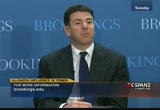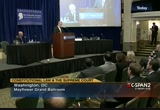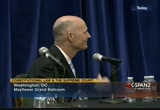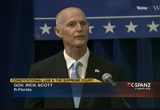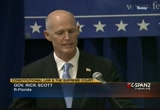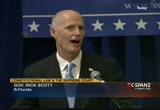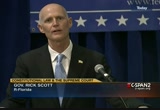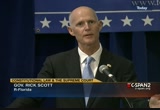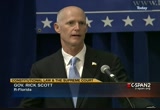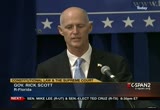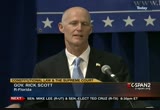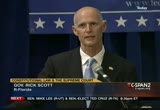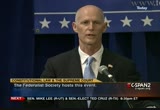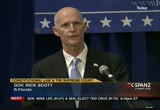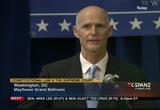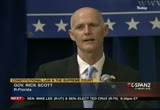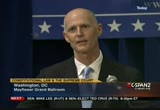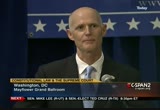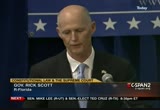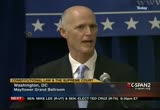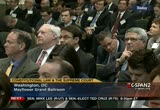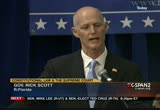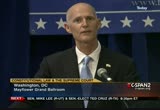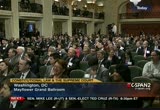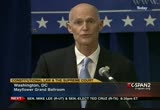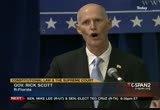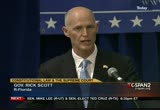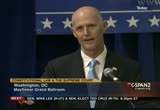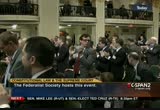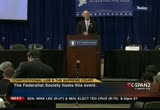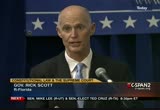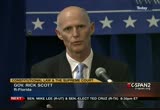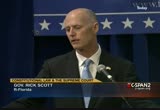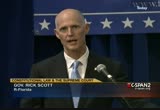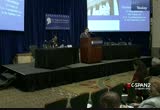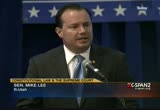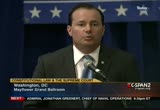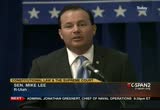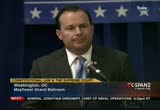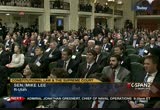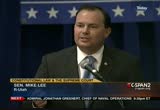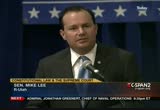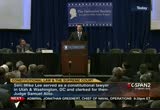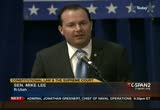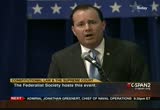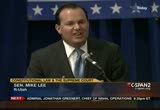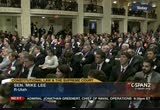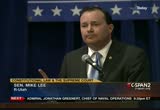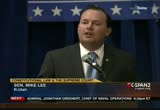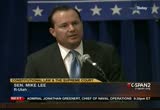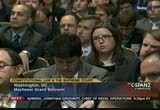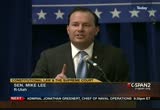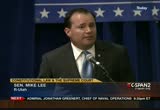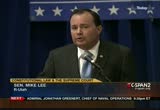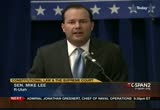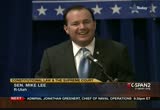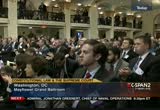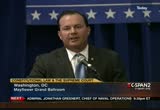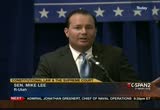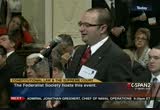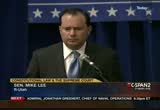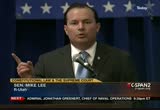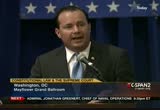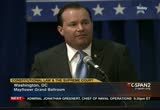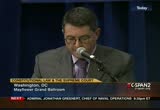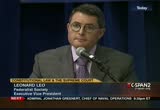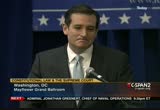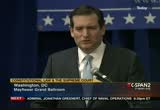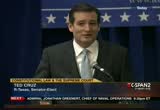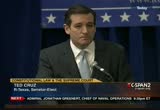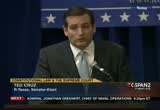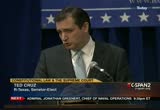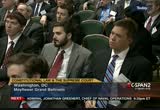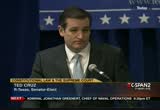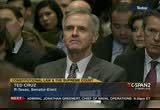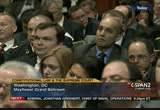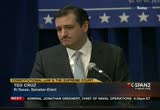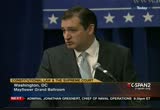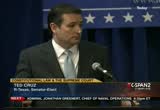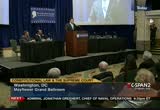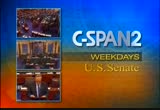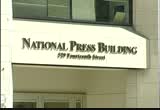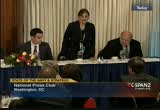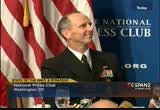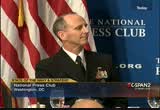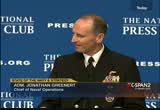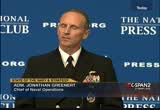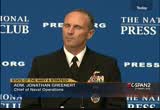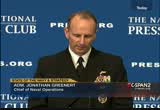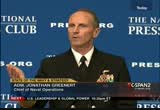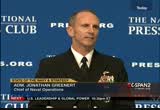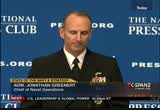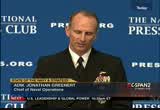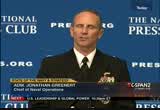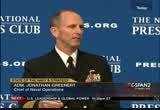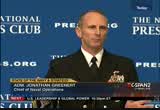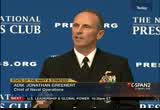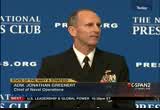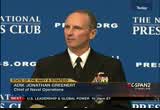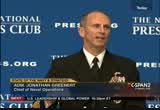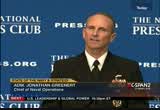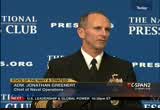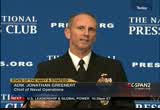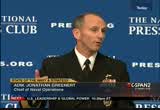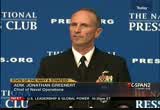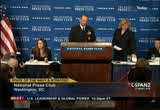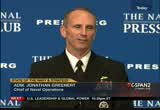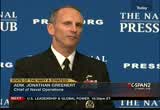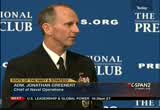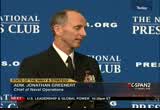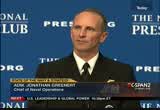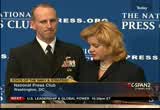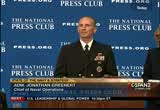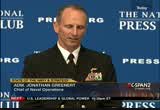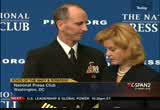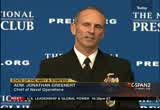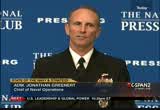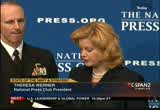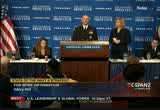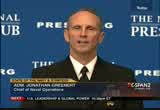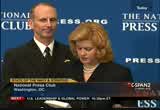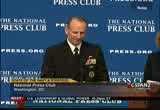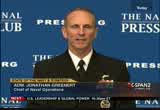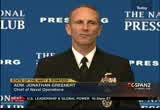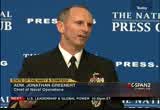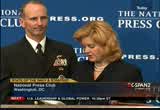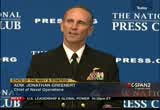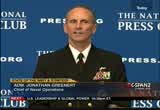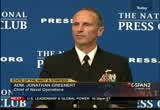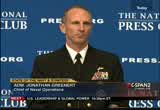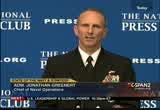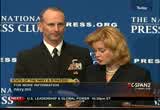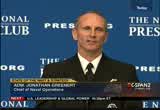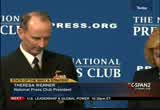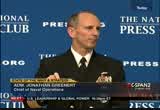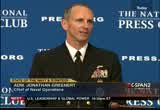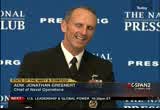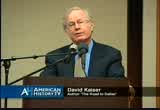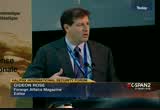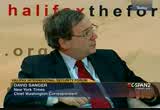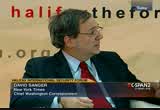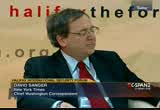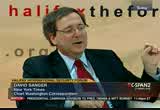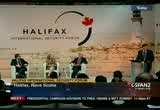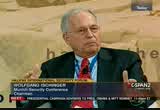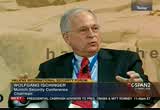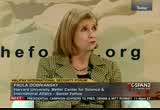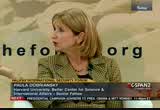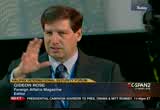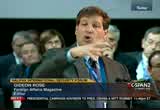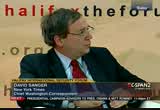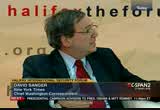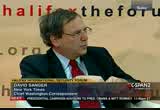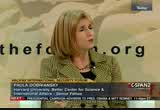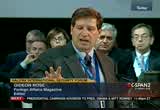tv Tonight From Washington CSPAN November 16, 2012 8:00pm-11:00pm EST
8:00 pm
8:01 pm
>> now florida governor rick scott talks governing in florida and talk about expanding access to health care and the annual national lawyer's convention in washington, d.c. hosted by the federalist society. the topic is the future of constitutional law and the supreme court. this is just over half an hour. >> good morning, for the first address today, we welcome a man
8:02 pm
who is no stranger to hard work. raised in ad 340est household, learned the value of money, hard work, and traditional values, and this guided his pursuit of the american dream ever since. after earning the ged from smu, worked in the largest law firm specializing in health care manners. later, in founding the hospital corporation, he established what has become the largest for-profit health care conglomerate in the nation. they employee over 199,000 people, that's job creation, of course. [applause] it provides quality health care to millions of people, but he didn't rest there. they have also worked with a group calledded world vision to
8:03 pm
provide primary health care, a primary health care system in kenya, and he upheld the commitment to the people of florida emphasizing the importance of accountability, ran the campaign under the slogan "let's get to work," a phrase that still resinates with floridians today. his policies fostered prosperity, and he had 25 months of executive job growth. we have an entrepreneur who succeeded in the private sector and translated that success in the government sphere. sadly, governor scott's mother passed away, but he is here today fulfilling the commitment to us. of course, our thoughts and prayers are with you, governor, and your family. he is a governor dedicated to his people, to the rule of law,
8:04 pm
and to the future of the united states of america, and we're very pleased and honored to have him here with us today, governor rick scott. [applause] >> good morning. thank you for the introduction. the -- it's great to be here, i want to introduce you to a couple people. this is my wife, ann, married since we were 19 years old. we've been very fortunate. [applause] she makes sure if i say anything, she corrects it, he didn't really say that. she does communications. [applause] [laughter] and then my general council, and he's done a great job. [applause] so ten days after a long and con contentious presidential election, it seems our whole
8:05 pm
political system has become a constant campaign. one election barely seems to end before in the middle of another one. there is virtually no breaking in between. that leaves us tiredded and a little aggravated. a break is especially important in between elections because elections are about problems. good governing is about solutions. today, i want to take a break from the constant campaign in washington and talk about solutions. as governor, my job is to help solve the problems of florida families. first, everybody wants a job. everybody i met in florida, they want to go to work. second, every parent wants a great education for their child because they know that gives their chance the opportunity to live the american dream. they have no interest in the cost of living going up. in 2010, as i started the
8:06 pm
campaign, i was a complete newcomer. i had never run for office before. growing up, as you heard, my family struggled financially. my parents, we moved a lot because my parents changed jobs to make ends meet. my father was a bus driver, a truck driver, and my mom of every hod job, ironing, a hostess at a chinese restaurant, a jcpenny clerk, got all my clothes from there because of that. i sold tv guides door-to-door to help my family. my parents never had much money, didn't have a nice house or cars, but what they did teach me was there was an american dream. it didn't matter where you started. if you could get an education, you had the opportunity to do anything you could in this country. as long as you were willing to work hard and sacrifice. i was determined to work hard
8:07 pm
and chase my dreams. as you heard after high school, i joined the navy, married my wifing ann, went to community college, went to the university of missouri, kansas city, smu for law school, and i started practicing law, and i practiced that for nine years, and i helped people build companies or buy things, finance things, and then i just decided i wanted to try to do it myself. i started a hospital company, and nine years later, we had 3433 hospitals, 285,000 employees, and it was just by doing the right thing every day, solving somebody's needs. is there an american dream left? do you have a shot anymore? can you start with struggling parents who teach you values and things like that and still build things? is the dream still alive? at the time, and still today,
8:08 pm
president obama's in the white house, and he's building a legacy of big government. at the same time, american families are worried about one thing -- if they have a job, worried about keeping it, and if they don't have a job, they are worried about getting a job, but in the last four years, what's happened? there was a focus on obamacare, and just constant spending, spending, spending. when i ran for governor in 2010, florida was in a similar position. we had one of the highest unemployment rates in the country. we lost over 700,000 jobs in the four years before that, our debt was going up, relied on the stimulus, but the biggest thing was we were losing jobs all the time. regulation was getting worse, and so the dream was going away, and florida should be the state where you can live the american dream. housing prices collapsed. everybody was worrieded about the future. having lived the american dream, i ran because i'm worried about
8:09 pm
it for our children. we have two daughters, 27 and 30. we have a grand son. i'm worried for them, my grandchildren, that generation, and for all florida families. in 2010, we didn't have a shortage of problems in florida. we had a shortage of solutions. what i brought to the table was serious solutions because they work, and i focused on one thing. jobs, jobs, jobs. i ran on a campaign. if you were in florida at the time, it was seven steps, 777,000 jobs over seven years. no way in the world on election day that you didn't know what i stood for. my message is simple. everything we do in government has to be focused on florida families. how can they live their dream? their dream is a job, a great education for their kids, and a low cost of living. every day, i'm con frapted with a new idea or proposal, and i ask how will it impact a family
8:10 pm
in the state making $40,000 a year? if we can make sure we give them the opportunity to live the american dream, it's a logical proposal to pursue. there's a lot of work left to do in the state, but we made progress, and things are headed in the right direction. biggest drop in the country, our consumer confidence at a five-year high, exports are up 18% year over year. we are going to have another record year for tourism, and i hope everybody here comes to florida. [laughter] by the way, fantasy land expanded, harry potter world's expanding. [laughter] we have lego land. my job is to sell the darn state. miami is still great, south beach is doing well. my hometown of naples is really nice, but our housing market has come back. housing prices year over year for september, september's up over 7%.
8:11 pm
home sales were up. all of this sort of economic indicators you think about are headed in the right direction. tourism, home prices, construction, all of these things are happening. more people move to florida, four years ago, we had out migration, for the first time, since, i think, 1946, something like that. it's doubling this year, the number of people who will move. about 135,000 people are moving to the state this year. most importantly, and in the first 22 months i've been in office, businesses in the state generated 174,000 more private sector jobs. in the more government job -- not more government jobs, but private sector jobs. positive annual job growth every month since i've become governor. a few minutes ago, we announced another 12100 private sector jobs generated in the month of october by the businesses. now we're at a -- unemployment's down to 8.5%, the lowest since december 2008.
8:12 pm
outstanding for florida businesses. [applause] i ran on a campaign of 700,000 jobs in seven years, and projections in the state is that we'll have over 900,000 jobs by 2018. these are the results, and we've gotten to this because we use conservative solutions to help florida families pursue their dreams. it started with four important steps. steps that reflect florida families and what the needs are. i travel the state pretty much every day and just talk to families. what do you care about? what problems do you have? if they have a problem with an agency, i get the agency head on the phone and solve it immediately. it always comes down to jobs, education, cost of living. first, we cut regulation, streamline the system, eliminate more than 2100 burdensome and unnecessary regulations.
8:13 pm
when i took office, they added 400 new regulations a year. the time is takes to get permits, slowing down business, and today, two days to get a professional license, and 50 days to get a permit. by doing this, it's easier to compete and hire floureddians. second, cut taxes by hundreds of millions of dollars. when i ran for governor, i promised that i would eliminate the business tax. we have no personal income tax in the state, eliminate it over seven years. today, more than 75% of the businesses in our state don't pay a business tax. again, that's helping businesses compete. i just announced last week we're going to eliminate another 2,000 up to about 80% of the businesses. if it's a better place for businesses to compete and have more money to higher people, spent money on marketing, we'll
8:14 pm
have more jobs. third, made the hard choices to reign in the government spending and balance the budget. we did that the first year, both years, without raising taxes. first year, predicted the deficit, and second year, watching every agency to watch and spend the money better, balanced the budget, and on top of that, paid down debt. we made sure the liability held by taxpayers and government employees for an under funded pension system was reformed to make sure that, one, businesses didn't think there was a tax increase to pay for that, and, two, individuals rely on the pension plans to know there was a pension plan when they were finished. fourth, we worked to improve the education system. we focus on it 100%. is it going to help somebody in their college or career? increased funding by a billion dollars this last -- for the
8:15 pm
year july 1st, and accountability measurements to ensure our kids are ready for either -- when they finish high school, they are ready for college or a career. our economic turn around for florida families is well underway, and we are proof that conservative solutions work. keeping the cost of living low for families and growing the economy so anyone who wants a job can find one is not just great policy, but critical to preserving the american dream for future generations. as governor, i compete with other states for jobs, and some of the states are relatively easy -- [laughter] california -- anybody from california? illinois, connecticut -- thank goodness. [laughter] what those states are doing is raising taxes, raising regulation, and so that's -- that's our, you know, we're competing and so what we do every day is find companies out
8:16 pm
there who can't compete. i think about it as this. if you're in business or think about yourself as a consumer. as a consumer, name a time you said to yourself, you know, i'll pay more for that product because they are headquartered in the high tax state. [laughter] oh, gosh, they have more regulations, i'll pay more for that because it costs the company more because they have regulations or it takes longer to get a permit. you don't do it. if we make sure that florida businesses have lower taxes, less regulations, faster permitting time, a pro-business attitude, our businesses will out compete everybody. we'll get more competitive every day. our biggest competitor is texas. texas is doing the right thing. look at the last of the eight years, texas is the number one place to do business. when i first got legislated, i -- there was a republican
8:17 pm
governor association meeting, and ann and i met governor perry, but didn't know him well, but i said here's the deal, i'm telling everybody i'm going to kick your rear. [laughter] i want everybody to understand we're going to compete, and so i said you can take it nicely or not, and -- [laughter] so he said he would, and so we've been on squawk box and talking about how we compete for jobs. i invited him to a fishing tournament in destin -- i didn't tell him some of the things we did, but invited veterans, and so i thought we needed team hats. our team was beat perry -- [laughter] his team was called, i'm worried. [laughter] the huge bowling trophies, i got one with a number two on it because he would be in second place in something we did that day so i scheduled to go on neil cavuto together, and i scheduled to give him a great trophy in
8:18 pm
the middle of the segment which he really enjoyed. [laughter] i wanted him to be use to being number two. texas is doing the right thing so conservative solutions are clearly working in places like texas and florida for americans to fulfill their dreams which is really, they want to get a job, great education, keep the cost of living low. perhaps, now, more than ever, it's important for states to stand up for the principles and policies that the federal government ignores. we'll balance the budgets, cutting taxes, and eliminate regulations that prohits free market solutions and economic growth. states could be in an even better position if we had a federal partner that believed in the same things we did. florida's the fourth largest state in the nation. anybody here from new york, we're about to pass you. we'll be, i think, in another 12-18 months, the third biggest
8:19 pm
state. the international hub of miami and a tipping point in presidential elections. i believe and am convinced if florida, texas, in particular florida, does the right thing, the nation will eventually follow. alexander hamilton in a speech to the new york constitutional ratifying convention in 1877 -- 1788 that citizens have to dwell on the balance between national and state government with particular attention because it forms a double security for the people. if one encroaches on the rights, they will find a powerful protection in the other. we all must work aggressively to protect the american dream for future generations from the very outset of the constitutional experiment, there's been a temptation for the federal government to expand the reach of government. the last four years, a lot more, and to diminish the sphere of inindividual freedoms along with
8:20 pm
it. in the face of adversity, it's easy to look to an all-powerful government machine that promises to fix all problems, realize every dream, and line every pocket. we know those promises are em empty, there's no government replacement for hard work and dreams. what citizens in this country have always yearned for and demanded is equality of opportunity, not the equality of outcomes. give me a shot. give me a chance. that's what we all want. government overpromises and underdelivers. government has no incentive to be efficient. in fact, i've began governor for 22 months, and they have not said i think you ought to completely cut programs that i'm responsible for. they say i care about this cause. i said, well, do we have
8:21 pm
programs responsible for the cause now? oh, yeah. i said, is your program better? absolutely. i said which one shall i get rid of? none. nobody says get rid of anything. then i asked, what tax would you like me to increase on florida families, especially your family, which tax. no, no, no, i don't want more taxes. programs are larger and unsustainable until the services they once offered are just hallow promises to be fulfilled on the backs of future generations. more promises lead to more spending. i'm not sure there's even an off switch to the printing machine of money up here in washington, which, as you know, we can't do at the state level. our national debt is impossible to fathom, much less sustain. the worst part is that our children and grandchildren will be left paying the bills. while promises and spending flow
8:22 pm
in an unmitigated stream for the nation's capital, those at the state level, we have to balance our books. in florida, we are required to balance our budget each and every year. a novel concept here in washington. that is a major reason why we reject short-sided politics of spending promises that result in long term cost to taxpayers. of course, our state increased state debt approximately a billion dollars a year for 20 years, but since i took office, first year, we paid down $500 million in state debt, and this year, about a $1.5 billion. increasing a billion dollars every year, to balance the budget, they borrowed more money. remember the stimulus that begun projects like high speed rail. in states without the financial support to continue them. you know, the federal government offered us $2.6 billion and didn't understand why i didn't want to bill the high speed rail
8:23 pm
project from orlando to tampa, 84 miles. the last pitch was it's a good tourist attraction. [laughter] people didn't understand why we turned it down, but here was the deal, and i think you still might be able to get it. you get $2.6 billion a year, okay? now, if you look -- you got to build the track and the train, historically, look at california, they thought it could cost $33 billion, but it's over $100 billion. you have to build it. you have to lose money. i have not found any rail projects that make a lot of money. if you want to shut it down, you fled to -- need the $2.6 billion back. nip want to take that? [laughter] i've done this all over the country, and nobody suggested it, but i guess california has, i guess. [laughter] or the mandate of obamacare.
8:24 pm
now officially reinvented as a largest tax increase in american history. that comes as only a few years of promised federal funding to support states that then we'll be forced to take that funding and raise our taxes. what i always ask people is what tax would you like to increase? my goal, though, is to work with the administration to reduce the cost of health care. if you think about -- when you think about what you want from health care, you want lower costs, that's the problem. you want good, great outcome, and you want great access. what i want to do is work with the administration to focus on those goals, not to ruin the cost of health care or increase the cost of health care and hurt access. in order to grow our national economy, government must live within its means. in florida -- anybody from texas? let governor perry know we are on track to beat texas. [laughter] on the national level, i know he doesn't believe that, of course, but on the national level, we'll
8:25 pm
continue to look more like the faltering economies of europe with rising inflation. think about what that's going to do, all the individuals in our country op fixed incomes. how do you expect we're not going to have rising inflation with trillion dollar deficits year after year after year? we have to band together and demand out of the federal government real solutions for fiscal management, and we need economic growth, 100%. somebody asked me the other day about the -- if i was in washington, how i would think about the fiscal cliff, and i would come to work every day own focus on one thing -- does it increase the number of jobs for americans? if it doesn't, you don't do it. all we have to think about is jobs, jobs, jobs. we're all here today because each of us believe in the american dream. in one generation, my family went from financially struggling parents to a son that has the
8:26 pm
greatest opportunity, the greatest job in the world, but hopefully no one runs against me in 2014, but, by the way, if you are, being governor of the great state of florida -- if you like people, it's the best job you can imagine. you get to travel the state and just talk to people and try to solve their problems. it is a great -- when i was in high school, my guidance counselor said i should be a social worker, and that's what this is. it is the greatest job in the world. [laughter] that's why i ran for governor, and that's why i'm standing before you today, conservative solutions work, and they will preserve the american dream for future generations just like my family. our principles are just as powerful today as they were last week, last year, and last century. we can debate how well conservatives campaign, and we can marvel at the tactics used by the other team, but the political landscape, as always, is bound to change. our ideas are permanent and
8:27 pm
lasting. they are worth fighting for now more than ever, and they absolutely work. as long as people like you are willing to fight for real solutions and conservative principles, this remains the country we know and love, a country that guarantees individual rights through limited government, economic opportunity through free enterprise, and security through robust, national defense. you all know as well as i do that we can never surrender our freedoms and our principles for the simple reason they are not ours to surrender. i want to leave you with a challenge as i conclude. i am challenging you to pledge your time, intellect, talent, and money to spreading conservative ideas. the central tenant to the american dream in every form possible. get involved in campaigns, run for office, do a stint in local
8:28 pm
or state government, do a pro bono case, pay attention to judicial appointments at the state level. most of the law, in this country's practiced in state court, and they have a huge impact on the state of our policies. as governor, look for traits above all others in judicial appointments, an inclination for restraint. i want to appoint judges who understand as a u.s. supreme court explained, that law is something more than the mere -- law is something more than mere will exerted as an act of power. if you think about being governor of a state like florida, your biggest legacy is probably your judges. we appointed about just over 80 judges now so far in 22 months, and so these are the individuals that are beginning to help -- decide whether we have three branches of government. i just remember civics, class, three branches of government, and i made sure everybody always
8:29 pm
remembers that in my state. the election is over. we may not be happy with the current occupant of the white house, but the question is what are we going to do about it? will you take action or stay on the sidelines? will you join the fight for conservative solutions with states like florida where we are fighting for families by creating jobs, quality education, and keeping the cost of living low? the time for arguing over who caused the problems has ended. now it is the time to break from the campaign and implement real solutions. we are doing it in florida. it can be done anywhere. i'm challenging each and every one of you to give in the reigns. our ideas are either worth fighting for everywhere, or they are not worth fighting for anywhere. i want to finish by thank you very much for the opportunity to be here, and thank you for what you do every day. [applause]
8:30 pm
>> thank you. we have time for two questions. yes, sir? >> [inaudible] >> freedom and economic freedom. >> oh, i think -- the question is is there a relationship between political freedom and economic freedom? absolutely. i mean, if you look at the countries that have the best political freedom, they generally have the best economic freedom. you -- i mean, if you -- think about if we want jobs, okay, business people want to be in a society where they know that they can -- if there's something going wrong, they can fix things. if we don't have political freedom, we're not going to have economic freedom. yes, sir? >> yes, sir, i was just hoping you could tell us about your decision regarding setting up -- or not setting up, but the state exchange under the affordable care agent, thank you. >> sure.
8:31 pm
as you know, the obamacare, because the supreme court -- well, we have two opportunities. one, we have the opportunity to do a state exchange or not. if we don't, the federal government does it, and then we have the expansion. what i've said is what i want to do is get and get our -- sit down with secretary sebelius and do something that does these three things. to do it is it has to reduce the cost of health care, the biggest problem, improve access, improve quality. now, here's the problem that we have right now. we're not getting a lot of information out of the federal government right now, but here's what we know. illinois is the next state that is smaller than us, and my understanding is the numbers out of illinois is that just to set up an exchange is $90 million, okay. who pays for that? second, it's projected to cost up to $90 million a year to run the exchange.
8:32 pm
who is going to pay for that? we're bigger. it costs our state more money than that. my concern is the exchange is not going to reduce cost, but i want -- i'm going to try to sit down with secretary sector sebeo improve cost, improve quality. my experience, i had -- this last year, we had, like, a 30-year-old lawsuit with a federal government over the everglades so i sat down with justice, epa, corp. of engineers, and interior to try to get a solution. by doing that, we got a solution that fulfilled our needs and theirs. i hope we can do the same thing. it's the same problem with the expansion of bamcare and medicare in our state. i want to take care of everybody that needs to be taken care of, we all do. i want there to be a safety net. i want to be able to afford it. i'm so worried it's going to force big tax increases, which will devastate our economy and
8:33 pm
do just the opposite of what floridians want. health care, lower cost, better quality, better access, and outside of that, jobs, education, and cost of living. last question, then we'll go. one more. >> i had exactly the same question, so i have a follow-up. has your administration considered how damaging it is to state sovereignty and state atomomy to allow yourself to be deputized into the implementation of federal policy? have you considered what a great way it is for the federal government to expand its power to deputize state agencies into implementing them under the threat of coming in and doing it themselves? >> i'll tell you what, absolutely. here's -- if you are governor of any state in the country, it's like this. first off, your budget, the -- it's tied to the federal money. all the federal money is free money, did you know that? [laughter]
8:34 pm
that's how they explain it to you. they are involved in every agency. i went through agency by agency because there's a grant -- well, they'll get you involved in a program, one that you might not be interested in, but everybody would like more money, the attitude is it's free money. the -- we fight -- we fight the -- fend state's rights all the time. for example, in our state, i want to have honest, fair elections. if you're not a u.s. citizen, you don't have the right to vote in our state. there's a state -- there was a federal data base called save out of homeland security that we asked for that we as taxpayers paid for that we have a right to, and they would not give it to us. we ended up in a lawsuit with justice, and we won. we won because we're on the right side. the -- so we have to look at every day about our own state sovereignty, what the rights are, and, i mean, it goes back to the alexander hamilton quote.
8:35 pm
for all ever us as individuals, whether it's economic freedom or the freedom to live our lives the way we want to, we got to focus on states' rights. if we don't, the federal government will run everything about our lives. thank you -- i'll finish by thanking you again for the opportunity to be here. thank you for what you do every day. have a great day. bye-bye. [applause] >> now we'll continue the discussion of the u.s. constitution and the supreme court with republican senator mike lee of utah and senator-elect ted cruz of texas. this is about an hour. >> good afternoon, ladies and gentlemen. please take your seats. we're going to begin. it's our mid-amp session. [inaudible conversations] again, good afternoon. my name is leonard leo, serving
8:36 pm
as executive vice president of the federalist society. we hope you're all having a great time here at our 30th anniversary convention. you know, it's hard to believe this is the third occasion, i think, on which we are welcoming united states senator mike lee. seems like yesterday, senator, when you came to us just after your election in 2010 presenting your vision of our system of limited constitutional government. i remember you describing with the sense of hope and enthusiasm the desire you saw amongst the people along your campaign trail for return to our founding principles. i suspect that those principles do not resinate at quite the same pitch in the hallways of the senate as they did amongst the utah people along that campaignñtr trail. nevertheless, it is apparent from his work and effort that senator lee is irrepressible.
8:37 pm
in the midst of the consideration of legislation as well as participation in oversight and the cop -- confirmation process, senator lee harkened back to basic constitutional principles and respect for the constructional constitution more than i remember any other senator doing. is this having an impact? well, the senate, by design, is a place where things move very slowly, and so more time will be needed to determine whether senator lee is helping to pave the way for a lasting cultural shift in congress. i think we know this. more individuals have been inspired to run for public office because the senator lee's work and efforts, precisely because they want the strength and respect for the original constitution in washington. more americans are talking about the constitution because of senator lee and more intelligently because of him, and members of the senate,
8:38 pm
including some in his own caucus, are feeling more pain and anxiety when they back efforts that lack a firmer foundation in the founding principles. knowing that senator lee will be there at the barricades with a copy of the worn dog eared pocket constitution. welcome back, senator lee. [applause] >> thank you, leonard, good to be among friends. it's hard to believe since i was elected, two years since i took office. i'm glad we'll hear from my good friend and soon to be colleague, ted cruz, after awhile. i was pleased when he was elected. i met him before his election an before a announced his candidacy. i especially look forward to no longer being the newest member
8:39 pm
of the senate. it's. a rough transition. i no longer get carded. [laughter] i'm from utah. i'm not used to getting carded. [laughter] you laugh, but it actually happened. it happened a lot when i first got there. they looked armed, and i can't argue with them. i can produce my io dee, show it to you, it says united states senator representing utah, mike lee, expiration, january 3rd, 2017. [laughter] i don't know whether that's when i permly ex-- personally expire, or -- [laughter] we went through this charade when i had to go vote. after awhile, i discovered a shortcut to it, a little lapel pen here was given to to me after i was sworn in. i called it my sorry senator
8:40 pm
pep. when i got carded, i pointed to it, and they said, sorry, senator, come on in. [laughter] it works most of the time, not all the time. one time, not too long ago, on the floor of the senate. i had one hand gently resting on one of the desks, and one of the non-uniformed staff came to me, don't lean on the senator's desk, but it was weird don't leap on your desk, but i respond well to authority. i'm sorry, won't happen again. he said, are you with the minority, what do you mean, on this vote or the next? i don't always vote with my party, but i do most of the time. [laughter] no, do you work for the minority leader. i thought it was philosophical. i said, well, of course i support mitch mcconnell, here's our leader. are you part of the minority leader's staff? i realizedded i pointed to the
8:41 pm
sorry senator pen. blank stare, he had no idea what i meant. at that point, i timidly said, i'm senator lee. what? my name is mike lee, i represent a state called utah that resemis a chair. it's square. [laughter] he got it, the color ran from the face, and he said, i'm sorry, my name is steve if you want to report me, and then he ran for the door. [laughter] i felt bad for steve. i liked steve. i chased after him to ensure he knew no hard feelings. every time i say hi steve in the hallway so he knows there's no hard feelings. his name is probably not steve. [laughter] so, you know, when i started this year, 2012, i was looking
8:42 pm
forward to two things, two steps i believed would help us fundamentally transform our government into that kind of government or something more closely representing, resemilling that government that our founding fathers end visionedded for us. one of the events, they would occur in june, probably for the end of jupe, probably the last of june, which i identified adds june 28th -- i was right. the other date i recognized as potentially transformative of our government, the other date that i recognize that i thought would probably have a positive impact op the development of our constitutional system of government was november 6th. i would just like to say at the outset that i want to thank chief justice reports for preparing me on june 28th for the disappointment i would feel on november 6th.
8:43 pm
[laughter] i read all the briefs in the case. i sat through four days of oral argument in that case. i watched every movement, every eye twitch, every facial expression, and listened closely to all the questions asked. i thought i knew what the answer was going to be. a lot of it was wishful thinking, but i approached the courtroom that day with a lot of anticipation and a lot of hopefulness. as i took my seat in the bar section of the supreme court that day, i looked around. i looked to my right and slightly behind me to the section of the courtroom where the law clerks sit. i remember a few years earlier, serving as a law clerk to justice alito, and i remembered how much fun it was to watch the justices announce a decision they had been working op.
8:44 pm
we knew the results before the audience did. it was fun to watch their reactions. i looked to the left and in front of me and saw the podium where so many lawyers have stood over the years, countless lawyers who i saw stand there since i started attending arguments at the age of 10. it was an odd habit i picked up as a child. [laughter] many of those lawyers stood their shaking. you could see them shaking because they were so nervous. their shaking was severe when they got a question they didn't anticipate. other lawyers stood there as calm as if they were discussing the weather with a friend. my dad had been in the latter category. i saw him argue in that court many times. sometimes i thought testifies too casual, but he was good at what he did. i could almost here his voice resinating through the microphone as i thought back to the last time i saw him argue
8:45 pm
before that court in 1994 against a worthy opposing counselman john roberts, a good and interesting day. as the thoughts raced through my head, sooner or later the clock struck ten, and at the appointed hour, the gavel and clock operated almost as if in perfect unison. i heard the familiar pound of the gavel by the marshel followed by the follow incantation, all those having business draw near for the court is in the session. god save the united states and this honorable court. these justices materialize behind beautiful red velvet draperies. they start to announce the decisions, and, you know, true to form, the court held the most interesting case for the last case. the emotion in the room reached a certain country --
8:46 pm
cresnedo, and it came time for the announce. i, along with most of the conservatives in the room, was elated when chief justice roberts started announcing the opinion. i took that as a very, very good oman. i was more e lated when he launched into the commerce clause. i was elated for the third time in the last 75 years, the supreme court was identifying something, anything beyond congresses' immense power under the commerce clause. the tension in the room was pal palpabloe. conservatives crying tears of joy, and liberals crying for the opposite reason. out of the clear blue, the wind shifted. the wind went out of the sails of conservatives and into the sails of the liberals as the chief justice continued to explain through the dismay and shock of many of us, that even
8:47 pm
though congress lacks the power to tell individual americans that they have to buy health insurance, not just any kind of health insurance, but that health insurance that congress in its wisdom deems necessary for every american to purchase, that that power could somehow be exercised under the taxes clause. this was a shocker. it was a shocker in part because the chief justice, in his announcement within the court, left something out. he left out a piece of the puzzle that i didn't get to see until after i left the courtroom. the piece of the puzzle was that the court simultaneously concluded that the penalty attached to the individual mandate was not a tax for the purpose of the appty-injunction clause, but the court said it is a tax for constitutional purposes. the chief justice dealt with this shortly in a paragraph as i recall saying, well, a tax for
8:48 pm
some purposes might not be a tax for other purposes, and that's the way it crumbles. you might have a tax for statutory purposes, congress dsdzs that, but not whether it's a tax for constitutional purposes. he never explained why the standard was more rigid on one side than on the other or make an effort to explain request the court should be so willing to expands congress' power. it went on. it continued to be a roller coaster ride. he continued to tantalize, taunt, and then torture cop servetives moving on to the medicaid expansion provision explaning to us that for the first time in its court had actually identified something that congress had done that violated the anti- coercion principle. that congress coerced the
8:49 pm
states, and this was intolerable. they were bop up just to have the wind taken out of the sails again with the court's novel construction with the unprecedented remedy, a remedy that said, yeah, this is unconstitutional, but we're just going to order the government not to do that which the statute empowers the government to do. in other words, the affordable care act specifically said that this secretary may withdraw the existing federal medicaid revenue stream from the states that refused to expand the medicaid programs along the lines contemplated by the affordable care act. it gave the power to the secretary, but that which congress gives, the chief justice takes away. he did it with a stroke of a pen. so what we saw that day was something very interesting. i struggled as i left the courtroom that day starting to
8:50 pm
talk to reporters who gathered to get reactions from members of congress who would refute the decision. i heard myself very quickly expressing a degree of optimism and enthusiasm for the decision. after all, the court had drawn a line in the sand ompt commerce clause, had, for the first time, utilized the anti-o ergs principle to declare something unconstitutional, but no sooner had the words left my mouth, no sooner had i expressed that thought, that i realized that it was really a very limited purpose victory, and i don't mean to disparage or discount the fact that it was a good thing, due to the efforts of great lawyers, lawyers like randy barnett here with us today, we got a limited purpose victory, but my point, today, is we can't overlook what we lost that day. we lost something very, very important. what we lost that day was the
8:51 pm
right that we have as americans to live in a society in which our national government operates according to this separation of powers' principles that's been vetted in the constitution. now, this separation of powers is important because we can't have a court making laws. that law's entrusted only to the elected congress, and, yet, that's exactly what had happened that day. the supreme court rewrote the the affordable care act, not just once, but twice. first in deciding that that which is a penalty and that which, according to nearly a century's worth of precedence, was a penalty because of the fact it imposed a financial exaction as a result as a failure to comply within an affirmative command of the law was somehow a tax, requiring a rewrite of the statute, an amendment of the statute. not just any rewrite or amendment, but the amendment
8:52 pm
that congress, itself, had been up able to achieve, support, or enact. i found it very significant that congress had, in fact, tried to pass the individual mandate as a tax provision, tried to end force it with a tax. they failed to achieve the votes. why? well, for reasons we all understand. it's really difficult to get a new tax passed in congress. that's what happened here. they couldn't get the votes. they couldn't get it passedded. it didn't matter at the end of the day because the chief justice rewrote it and turned a penalty into a tax. it got worse than that when he re-wrote it again in order to erase power the statute affirmatively granted to the secretary of health and human services. we losted opportunity to have laws written by those of our own choosing, by men and women who stand accountable at regular
8:53 pm
intervals in for two years, andx years for the house of representatives. we can't overlook the fact. there's two constraints we face in the constitutional system. the one constraint, inclined to focus on as lawyers is the judicial constraint. if congress does something, if that something is repugnant of the constitution, then the court is supposed to step in and invalidate it. the court is supposed to serve as the check. the court can't serve that function if, at the end of the day, it's unwilling to exercise that power. the judicial check was removed in this case. the court, faced with constitutional defects, overcame defects by rewriting the statute. it did so in a way that makes mappers worse by virtue of the fact that it got rid of the second kind of check, the political check. you see, because after this ruling, it's no longer a -- if
8:54 pm
you can't get legislation passed in a mapper that's constitutional, don't worry about it because the court will rewrite it and take care of the judicial backstop and the political backstop as well. this is not okay. it's not okay, especially because this will, in turn, further facilitate the emotion of the other of the constitution's most important principles of federalism. the notion that the power of the federal government is limited, few and refined to the states that are numerous and indefinite. we cannot embrace and accept this as freedom loving americans, certainly not as judicial conservatives. this is not something i think we should praise. i want to make it clear that i have nothing for profound professional respect for chief justice roberts. he's a good and decent man, and for the most part, an outstanding jurist throughout the course of the career.
8:55 pm
make no mistake, this was a sharp aberration from that professional standard he established early in the career. i hope, and i expect, that this will prove to be just that, an aberration, and it will not be something we can expect more of in the future. you see, because, otherwise, if this is something to expect in the future, we will have found ourselves not only not benefiting from any limitations established by the nfil versus sebelius decision, but we'll find ourselves with a bigger and bigger government, one facing more and more burdens as a result of its own inability to fund its own operations. ultimately, the rule of law requires more than that. now, when we look back at the reaction that some in our community had to that decision, there were some who immediately praised it. there were some, even, self-professed conservatives who
8:56 pm
immediately said it was a brilliant decision, a master-minded decision because, you see, he preserved the constitutional credibility of the court, preserve his power as the chief justice to look autofor the court's own constitutional interests. he did that by showing to the public that he was not partisan. that he was not going to take one side or the other, but chart his own middle group, cut it right down the middle. this is not a good justification even though a lot of self-professed conservatives claimed it to be such. it is not one because remember jurists take an oath to decide each case objectively on the basis of the law and the facts before them. they will decide that case regardless of how they think the public might reagent to it, and so looking out for the constitutional credibility of the court, to the extent that means the public's opinion of the court, is not only not a good justification for changing
8:57 pm
your opinion, for altering judicial analysis, but it's a pernicious evil within the system. it's not something that we can respect. to the extent that this was just an idea of let's split the decision so that it is even-handed because that's fair, the chief justice, i don't think believed that that's a good thing. i don't think any of us think that's a good thing. remember when what was solomon's most famous case, his purpose was never to apply the law in the fashion that he prescribed. he was on a fact-finding mission. his only objective in suggesting that they split the baby was not, in fact, to split the baby. the law didn't require it. it certainly wouldn't have even allowed it. had he undertaken that effort, neither party would have gone home happy. what he did in that case was simply to uncover the truth.
8:58 pm
it was never intended to result in the splitting of the baby. unfortunately, in this case, what we were left with was app attempt, i believe, by a court that was determined to give each side some of what it wanted, but sometimes one jurist attempt to do that and consider that an end unto itself. a lot of harm results. just as harm would have resulted in sol mop -- solomon's most famous case. we have before us a number of challenges as a nation. i think those challenges can either be made easier or more difficult as a result of our willingness and our ability to communicate the republicans why it's so important that we live under a government that recognizes some restraints on its open power, that rerecognize that each -- recognize that each branch of government has its own power and shouldn't step on any other branch's power, and we have to
8:59 pm
stand up for the principle that not every power should be exercised at the national level. the more we stand for these principles, as unpopular as they may be, difficult to explain as they may be, i tend to believe that our best days will be ahead of us as americans. you see, americans are smart. americans are able to recognize truth. truth resinates with the american people. in order for it to resinate, it has to come from us. we have to speak it. we have to identify it. we have to identify error where we see error. this is one instance where ere rough has occurred, and i hope we won't ever shrink from the task of identifying error when it arises especially when it jeopardizes the health and vitality of the great, god-given constitutionality of our system. thank you very much.
9:00 pm
[applause] >> we have time for two questions, maybe. >> good afternoon, senator, lee, thank you so much. the third time i've heard you speak here, and you are ever-more inspiring every time. go back and look at chef report's confirmation hearings. he was asked many, many times about the theory of restraint and deference. ..
9:01 pm
what their views are an editor or company will ask them to identify, even if it requires some degree of speculation. what if anything falls outside of congress' power under the commerce clause? and make it a little more difficult for them by telling them they can't identify lopez or morrison and now add to that nfib is the basis of their
9:02 pm
theory that something positive for the government's power. he was going to quit interesting to watch some of the responses. a lot of them look as if i've asked them to insult their mother were something like that. some of them look at me as if i pass them to derive pi to the 800th decimal for memory. but it is an important question and it's a question that i think needs to be asked a lot or coughing. when the question is asked of the supreme court, if that is interesting to watch variations of that question be asked during the nfib arguments and to listen to the solicitor general hamm and a half and not come up with anything beyond congress' power. >> senator, you're perhaps your response to president obama's
9:03 pm
least appointments of three individuals as after some initial vote, some of them came out and so was wondering, one, have given assurances given that will not repeat and that's why you're more flexible later on. and two, will there be a similar response from you or your colleagues or both of you should senator reid decided to proceed and change the filibuster the at the beginning of the 113th congress? >> surfers the recess appointments issue. this was an important issue for me. when president obama made for appointments that he identified as recess appointments of january 4th, 2012, 3 to the nlrb and one being richard cordray at the consumer
9:04 pm
protection bureau. he wrote with precedent. people with both parties have been found in responding to this by saying look, every president for nearly every president has made recess appointments. the other party always complains. get over it, grow up. but those who say that overlook something very important. this is unprecedented because as far as i've been able to ascertain, the first time, the only time in history when any president has reported the recess power at a time in the senate according to its own rules is not in recess. it's significant in fact that just 24 hours before these appointments were made on january 3rd, 2012, the senate had held its opening convenient session of session two of the 112 congress. congress is generally consist of
9:05 pm
two sessions, session one the first year, session two the second air. the session had just convened its inaugural session of the second session 24 hours earlier. according to the senate rules, according to time-honored precedent and tradition, we were not ensuring for purposes relevant to the recess appointments clause. said that is why signal my displeasure at this. i have to think of some thing in order to keep it in the news because it's important people continue to talk about it. so i voted no on a number judicial appointments since then after that point. towards the end of the year, elected my categorical policy only because the senate republican conference had picked that point in my opinion adequately responded to what the president did by invoking the leahy thurmond rule, refusing to process additional judicial
9:06 pm
nominees within a category beyond that point. so i regarded that as a sufficient response. i said at the outset until such time as my party response or until i get some assurance of the president this won't happen again, i'm going to continue to vote no. as to the second part of your question, if harry reid undertakes this very nuclear option at tinkering with the filibuster rule, if every anticipated he tries to shut down the process of cloture votes on motions to proceed, we will regard that as a threat to the institution and a threat to our system of rules, a threat to our system that is made within a supposedly the greatest of it but it legislators body in the world and there will be a strong and proportional response. i can't tell you exactly what that will be a in part because we don't know what form harry
9:07 pm
reid's efforts might take, nor are we certain he's going to do it yet. for trying to convince them it's not a disinterested unit. rest assured we are not going to take kindly to that. [applause] >> well, this is wonderful having you here again, senator. this is a double feature this afternoon. i had the privilege of also introducing our next speaker, u.s. senator elect, ted cruz from texas. it was two years ago when ted cruz came up to me and others in the room here, this room, said he was contemplating a run for the u.s. senate and asked for a reaction. trying hard not to pour water over ted's noble commitment to public service, i resisted the temptation to underwood instinctively would roll off of most of our times when a friend
9:08 pm
confronts us with such a request for a pace. are you crazy? do you have a fever or? have you sought professional help for this deviant behavior? taken a slightly different tack, i asked all the usual questions. is it the right time politically? you really think the money is there? is your family prepared for this? have you checked all the necessary boxes back home in texas? any of you who know ted cruz at jesse responded to this question is looking rather reflect undiscerning, but she knew below the surface tethers optimistic and rearing to go. and he wanted to do this from his experience with the bush campaign and his bid for attorney general, he knew he was ready for the political fray and while he probably was not sure whether the timing is right electorally, he probably knew from his experience as solicitor general of texas, as an official in washington during the bush
9:09 pm
administration and is a former law clerk to chief justice william rehnquist that it was important to get to the business of trying to defend our system of many constitutional government in the halls of washington sooner rather than later. by the end of the conversation, how could i be anything but thankfully he wanted to run and hopeful for success? test drive, optimism and zealous pursuit of public service out of the commitment to our constitution paid off with great sacrifice from him, his wife heidi and their family, ted stevens before us is senator elect from the state of texas. we are all the better for it because we have in the senate a good man with extraordinary skill and intellect had with unparalleled and unflinching commitment to our constitution of small limited government. i have no doubt that ted cruz
9:10 pm
will quickly emerge as one of the key spokesman for the constitution state alongside of course senator mike leigh. please extend a warm welcome to long-time federal -- fellow federalist, senator elect ted cruz of texas. [cheers and applause] [applause] >> thank you very, very much. thank you. well, thank you on the planet for that very, very warm welcome. it is great to be back with family. like many people in this room, i've grown up in a federalist society. this has been my home for my entire adult life, my entire
9:11 pm
professional life. the federalist society having a 30th anniversary now. i first became involved with this group 20 years ago when i was in law school. at this time i have to admit 20 years ago the federalist society 30 seen the established major power, which probably reflects a naïveté of one out. but it is truly breathtaking how we have journeyed together. the first thing i have to say is there's a lot of men and women who believed in this crazy improbable journey when no one in their right time but have. who express the same forbearance discussed. although i have to admit, the are you forgetting crazy was implied. [laughter] but leonard is far too diplomatic to have said that out
9:12 pm
loud. i have to tell you two years ago i sat in this room and listen to them for a new senator stand and give a speech that was just jaw-dropping. let me be clear, there is no two united states under cummins hero and the u.s. senate or remotely like mike leigh. [applause] i will tell you afterwards, he and i went and visited. it was actually the first time we met and we spent the next couple of hours debating constitutional law. when you just get elected and you're pretty senator elect, they could be a little office in the basement of the capitol that is very down in the elevator. i can tell you i'm pretty sure i
9:13 pm
saw wandering outside. i spent a couple of hours of mike walking around. i remember it was in fact this friday because it is the day his committee assignment requests were due. so i walked with him to the secretary of the secretary of defense office to hand in his request for committee. i remember one of the things we were talking about at the time as the national debt, which is at the time $14 trillion a few trillion ago. it so happened that gao had come out with a report that estimated the value of all the land owned by the united states government was right at 14 trying dollars. now that struck me as a fairly convenient equivalents and i don't see any reason why the united states government should be the largest landowner in the world and why it should on much of the united states west of the
9:14 pm
mississippi. so we began discussing that and it occurred to me that i was in the presence of a fellow traveler, and the presence of a fellow federalist. mike was the first major national figure to endorse my campaign right when we launched and i remember just a month or two later we were visiting after dinner and talking about the senate and he said what can i do to help? i said you could endorse me. he said yeah, i could do that. he said i could do that, can't i? last night they looked at their shoes and didn't want to argue with their boss too much. i guess you can. and so, he jumped up and endorsed me when he hadn't been in the senate are djs. one of the first act it
9:15 pm
signified, mike leigh was not going to be a typical senator. when we started this campaign cannot allow to be jumped jumped on board, when we started, i was quite literally a 2% in the polls in the margin of error was 3%. [laughter] which is my math service to me, means technically i could've been at negative 1%. it might've been the case that 1% of tickets would've gone to the polls in britain and, not cruz. we went $350 million primary. most expensive primary and the entire country. i can tell you that you have not lived until you've had $35 million in nasty attack ads against you. midway through, my wife heidi watching one of the ads turned
9:16 pm
to me and said goodness gracious, i didn't realize he was such a rotten guy. [laughter] we were outspent three to one. in any other race, i should have been roadkill. i should've been an armadillo by the side of the freeway. for those of you who aren't texans, you can go home and look it up. and we saw something extraordinary happened. we saw thousands and thousands of republican women committee party leaders, business leaders, conservative at the cell of the state of texas come together, begin knocking on doors, making phone calls, reaching out to their friends and we ended up going from 2% in the polls do not just winning the primary, but winning by 14 points. it was an incredible testament to the grassroots, to the way
9:17 pm
politics should we. now, the main message i want to convey to folks today is a combination of retrospective and days. retrospect of asking what the heck happened last tuesday on the election because the election wasn't pretty. prospective asking, where do consng, where do conservatives go moving forward? i think those two questions are closely intertwined and i'm going to cut to the punchline first and then go back and get to their. the punchline is that the federalist society has done in the world of law in three decades has been extraordinary. jean mayer and i were the same right before hand and she laughed and said what and i
9:18 pm
visited said you're going to run two years ago, he said i foolishly but you could win. [laughter] i laughed and said sheehan, that is a sign of our collective naïveté. the three decades ago in the federalist society was founded, the missions are impossible to achieve. it took a bunch of naïve idealists oblivious to the realities of conventional wisdom to do what we did to the law. what i'm going to suggest to you is, to flee we need to do to politics what we've done to the law. where is the federalist society, in three decades? three decades ago it was a very different legal world. this organization come out last night the law school is trying to shut down federalist society
9:19 pm
groups are made in bringing in speakers. why? because we are winning the arguments. go back and read a statutory amendment. they began with we have before us a statutory question. the legislative history is as follows. therefore. many of those decisions you can even find a statutory text in the opinion. maybe it is a footnote if you're interested in what statue you are talking about, here's the citation to it. go look it up. far more relevant as the subcommittee report that one member of congress said on the subway in the way to get a cup of coffee. [laughter] originally some, didn't exist. and what did this organization
9:20 pm
do collectively? we started making the arguments. we started making the arguments of all matters, but we have a constitution and the constitutional protections matter. read in a statutory interpretation decision today. everybody today starts with a text. they don't always follow it, but they at they at least start with there. for some it is the thing to be gotten around. the basic knowledge that is a to be gotten around. you know, to look at the decision like d.c.'s the howler. now, i think that was a tremendous victory for second amendment rights. one of the striking things is the principal defense purports to be an originalist to send. it's very bad original as some, but what a statement of the jury
9:21 pm
that in the words of the parisians were all originalists. that is a sign of what happens in the legal world that we have won many arguments. the legal world is transferred because the men and women taking a principal focus at winning the argument. my view of the political world, you know, this is an organization that reveres the constitution. i would guess if i asked the people of this term, how many of you would like to be a federal judge? half of the hands would go up. but the constitution, but from the federal judiciary incredibly important. it's of course an article iii of the constitution. there is a reason the framers begin with article i and article article ii in the courts of the
9:22 pm
political branches are inextricably intertwined. we may well see consequences of this last election under judiciary the next four years in a way that i think is highly careless. you know, the press after any election in which republicans don't do well, it always rates that have lined, the problem was those pesky conservatives. that was written before the election day was over. if only republicans have become the democrat, they would've won this election. in my view, the election results on tuesday have one simple explanation. we didn't win the argument. we didn't even make the argument. our country was built on foundational, revolutionary
9:23 pm
ideas. you think of the founding fathers who fought a revolution first with bayonet. [laughter] clawback and for the record, there are today more bayonets in the military than they were in 1860. [applause] the dead, and even more important revolution. a revolution of ideas, from millennium we were told our rate can't from kings and queens of whatever we might enjoy work crimes given by grace by the rulers. the framers of our constitution converted the entire concept of sovereignty. they began from the proposition that every don't come from a king or queen or even a
9:24 pm
president. they come from god almighty. and the constitution exists to protect those rights into the mix government to serve as jefferson put it as chains to find the mission of government. for millennia, there's two ways to ordering a society. one based on free markets and entrepreneurship in individual responsibility and that has simply led to the greatest opportunity and prosperity ever seen across the globe. the other race based on collectivism, government control and socialism and that is consistenconsisten tly time and time again that she shares suffering and misery. it is not accidental and debates over obamacare that not a single democrat publicly pointed to any of the nations honor that currently has socialized
9:25 pm
medicine. and so that's what we want. because the effect over and over again of putting it into practice, getting nasty ivory tower has not been pretty, has been rationing and the poor quality, government aircraft getting between a synagogue tours. but we didn't make that argument. let me ask you, what was the high point of this presidential campaign? without exception, ever since the first debate between romney and obama. it's the one time we actually contested ideas, presented two viewpoints for the direction and then the remainder from politics to give the boys, don't show any contrast, don't want to go.
9:26 pm
so by the third debate and pretty certain that romney actually french kiss to barack obama. [laughter] and i have no doubt that there is a focus group somewhere of undecided ohio voters who lived in a cave for the last 30 years who decided they liked that. don't show any disagreement whatsoever to president, don't want to go. just be a nice guy and have a personality contest because those turn out so well for us. our ideas work. their ideas don't work. you know, even that first debate, how striking was it that when mitt romney presto, from his response was, well, under
9:27 pm
bill clinton there was great economic prosperity are the holy observer, is all about bill clinton and how nifty the economy was under him. i've got to tell you, i would've given a link to see that romney turned to him and say, mr. president, i knew bill clinton. [laughter] our ideas work, their ideas don't. the last four years our economy has grown 1.5% a year. that is less than half the historical average. for 70 years has averaged 3.3% growth a year. and this president is fond of saying he inherited the worst economy in the history of the universe. and everything, by the way, is george w. bush's fault. he doesn't have much historical
9:28 pm
memory when he makes that argument. any of you all remember 1978, 1979? double-digit unemployment, 22% interest rates gas lines, stagflation in 1888 different president. ronald reagan inherited a struggling economy. and reagan implemented policies 180 degrees opposite those of obama. incentive jacking up taxes, he slashed taxes. instead of exploding spending on the debt, he restrain the growth of spending and instead of unleashing the the regulators, by the way, what i think the regulators i can't help think of mr. burns saying release the hounds. [laughter]
9:29 pm
instead of releasing the hounds of regulators and small businesses a notch when there is, reagan limited regulation and the result was one of the most extraordinary burst of economic proactivity our nation has ever seen. the fourth-year regulation precisely corresponds to write here, the fourth year of obama's president be. anyone know what gdp growth was in 1984? 7.2%. our ideas work, their ideas don't. if you want growth, if you want jobs, if you want 23 million people struggling to find to get jobs, the answer is that the unique growth. they simplify the tax burden, reduce regulations and punching small businesses a notch for viewers. it speaks volumes of the 50% who voted believe the economy is
9:30 pm
george bush's fault. as the reason. president obama said that every single day and twice on sunday and we never responded. republicans were so terrified of uttering the words george w. bush that we never responded. let me give you another example. all of you all are familiar with the quote, war on women. ..
9:31 pm
[laughter] not nearly as thrilled as she is. [laughter] this attack was always deliberate mendacity. by the way, we got the foreshadowing. i remember way back then, the republican primary when george steph no las was moderating. why people like george moderating republican primaries? what is your view object contra accepteddive. that wasn't an accident. it was the democratic attack. everyone scratch their heads and say what are you talking about? nobody was talking about contraception. until they decided to cook up the attack. what the issue was really about,
9:32 pm
it wasn't too long ago that the democratic party was proud to have been the first major party to nonnate the first two catholics to be candidate for president of the united states. what do you think of al smith, or a john f kennedy would have said to a president who says to the catholic church, change your religious beliefs or i will use my power as president to shut down the hospital and charities. that is a radical view, that is an -- extreme view. never had anything to do with contraception which everybody has a right to get and nobody disagrees with that. it was about government forcing americans to violate their religious conscious, and yet despite having an administration that took a radical view, you know, the president got 50 percent of the catholic vote.
9:33 pm
got 71% of the hispanic. the vast majority 6 whom are catholics. did we even once make the argument in the catholic community? we didn't make the argument, if you don't make the argument, you don't win the argument. now going forward, my focus in the u.s. senate unfortunately in the minority are going to be working to cut spending, to push regulatory reform, and tax reform to get economic growth back. and what sky each of you do to is bring the same creativity, the same diligence, the same thinking and passion that each of you has individually brought to changing our legal world. bring it to the political discourse. if you want to change where we are, we have to win the argument. as margaret thatcher, first you win the argument, then you win
9:34 pm
the election. i look forward to working with each of you to do precisely that. thank you [applause] coming up the chief of naval operations followed by a look at the perception of u.s. power and leadership around the world. then ab analysis of the 2012 election with presidential campaign advisers to president obama and mitt romney. florida will be the keynote speaker this saturday at the political fund-raiser for iowa governor terri branstad. he has been mentioned at the potential presidential candidate.
9:35 pm
miami book fair is live this weekend with two cays of non-fiction books, author panels, interviews and your calls, e-mails and tweets. featured authors include many people. with a panel that includes the widow carol blue. our live coverage starts saturday morning at 10:00 eastern and sunday at noon on c-span2 booktv. join us online with exclusive author chats on facebook@facebook.com/booktv. chief of navel officers
9:36 pm
9:37 pm
worldwide, i would like to welcome the speaker and those attending the event. and if you hear applause in the audience, we know member of the general puckly are attending. it's not necessarily evidence of a lack of journalistic objectivity. i'd like to welcome our c-span and public radio audiences. our luncheons are also featured on the member produced weekly pod cast from the national prez club available on itunes. you can also follow the action on twitter using ntc lunch. after our guest speech concludes will have an q & a and ask as many questions as time permits. i'd like to introduce the head table and i'd ask each of you to stand up briefly as your name is announced. from your right john, editor for instituted for defense
9:38 pm
analysis. ann roosevelt, deputy managing editor for defense daily. ben dually, staff writer for kyoto news. andrea stone, contributor to the "huffington post." jim michaels, military writer for "usa today" and a former marine infantry officer. captain danny hernandez public affairs officer for the chief of operation and guest of our speaker. donna, "usa today" and former ntc president. >> i'm going skip the speak for a moment. jennifer shon berger. bill holland, associate editor of -- and former navel officer. jim noon, retired nay reserve captain
9:39 pm
strategic information and communications group. thank you all for joining us today. [applause] admiral johnathan grew up in pittsburgh suburb of butler pennsylvania. the son of a steel workers he was the third of six children. he was the all-american kid growing up. he worked not one paper route, but two. he was on the swim team, student counsel, a member of the national honor society, and the archery club. and to top it all off, he and his buddes were members of the major key club. a group that offered them to earn a few bucks either by selling hot dogs or waiting on folks at rotary club dinners.
9:40 pm
accepted a the university of pennsylvania, the military academy of west point and the united states naval academy. he made the smart choice and choose the navel academy. there he studied nuclear power to serve as sub mean officer. flip over the book from 1975 and you'll find a few tid bib -- tidbits. it distribution him as rebelling usely -- color weekend, it concludes with his personality, good looks, and quick wit. he's bound to be a success. coming from a navy family, i know how clairvoyant your books can be. he has successfully commanded at all levels including the uss honolulu he earned inspirational leadership. he served as a commander
9:41 pm
submarine. commander u.s. seventh fleet and commander u.s. fleet forces commanded. he most recently served as a vice chief of naval operations. he's a decorated member of the navy, having been awarded the distinguish metal six times. he's 930th chief of naval operations. please welcomed a mirm johnathan greenered to the national press club. [applause] [applause] ladies and gentlemen, i can assure you, you won't find all of those words in my biography. i really do not know where theresa. i know, where she must have gotten it. i thought it was embargoed. thank you, theresa. i'm honored and privileged to be here today, ladies and gentlemen. i would like to give a big outshout to the pastry chef who
9:42 pm
made the cupcakes. i'm about to burst in to tears. the logo on my cupcake was my last fleet command until i became a bureaucrat. this is saddening in a strange way. very inspiring. i think to thank you very much. it's been fourteen months in the job here. it's everything they promised me as i've been in the job. an amazing group of sailors, civilians, and their families that always impressed me. always wanting do more and more for something bigger than themselves. i've been honored to serve them. thank you for the invitation. i would like to talk about two things and take questions. one, our position. what our core position report today in the navy since my time as chief of naval operation and the rebalance to the asia asia-pacific a important initiative as we work to comply with our defense strategic guidance.
9:43 pm
our position when i started the job again 14 months ago and i looked out there what is it going to be like until the future? what's the sea out there? what's the channel look like. i saw the budget control act. i saw the arab spring going on around us. operation enduring freedom, afghanistan, and the schaings taking place there. and a new defense strategy probably on the horizon. i said, you know, i want to make sure that our folks in the navy from the war room to the board room to the ready room for aviators are focusing on the things that are really important. and i broke it down to three ten innocents or a way to look through thing, a lens. i brought them out and they are still applicable today. number one, warfighting has to be first. it has to be in our minds all the time. that's what we are put together to do. that's why the nation created a navy to be sure that with can assure security and if necessary win the wars.
9:44 pm
everybody, all of our folks -- war fiecting is the primary responsibility. two, we need to operate forward. our navy at the best when it is out in h about. that's has been the heritage, our legacy, our tradition through the years. as we exraitded the 200 commemoration during the war of 1812 and still doing it today. using innovative ways to to make sure the ships we have are where they need them to be. it's not necessarily how many ships we have. but how many ships we have forward. be ready, more than just parts, more than maintenance. more than fuel. it also means that we have confident and profeesht crews ready to do the job. those things i laid out. the six words remain applicable today in our key to how we view things in our line in the navy. our force today if you look, i
9:45 pm
passed out chart lets for you to help you follow along to make points here. we have about 50,000 sailors out today deployed on about 110 ships deployed around world and on the chart here where it says the navy you'll see where in the world they are. you notice about half of the ship that we deploy forward are in the asia-pacific region. and it's been that way for about ten years. we've had somewhere between 45 and 50 ships forward-deployed in asia-pacific. about a half of those ships deployed in the asia-pacific are there all the time. they're called the forward-deployed naval force. we get great leverage having a forward-deployed naval force. they are there all the time. they build relationships and assure allies and three, a little factoid to keep one ship forward from the continue then tal united states requires four total ships. one is there forward-deployed, someone just come back, one is
9:46 pm
about ready to go forward, and in the process, one is in deep maibt innocence. if we can leverage to upgrade our ships to keep them forward, we can get a good return on investment. about a third of the deployed ships in the middle east in the arabian gulf about a dozen plus in actually today about 18 ships in the mediterranean due to the issues we have in the mediterranean. the key here for me, as you look here, you'll see a little valve signs, if you will. i call the maritime cross roads. we have to have access, be at or have access to those places. those are the maritime cross roads. that's where the life blood of our world economy travels through. that's what we need to be able to maintain and insisting the world one of the primary jobs. so we develop also and nurture
9:47 pm
places, and you'll notice a little squares. places like the singapore, your coast of japan, jay beauty, and jay these are not our places. they are bases where allies allow us to go and refresh to resupply, to increase our logistic, and if you look around there, these are important places for us to continue our mission as we look out in the future. in my view, they are very important to our ability to continue to execute the defense strategic consult -- you'll notice lastly that there's little box on the lower left. it lays out for you how long it takes to get from the east coast or the west coast the suez canal to the strait of hormuz in some cases it's two or three weeks. if we're not forward and ready to get the job down, it's going
9:48 pm
to take time. operating forward is important. i mentioned that recently i published a position report in the navy when you are about out at sea once a day you prepared if the dan we call the 8:00 report. it's usually done in the morning or the 12:00 report if you choose to do it at noon. it's the position report. it's a fix that said here is the voyage. here's where we. and some things may have occurred. may have been set off the course due to wind or current. i published the position report to lay out for the navy where we are after my first year on the job. we have been set a little bit, if you will, on emerging challenges since i have taken the job. we have to adjust our course a little bit. some things that have emerged since i have taken the watch that we have focus on right now in the near term. one, sexual assaults. i'm troubled that we haven't moved forward to limit and
9:49 pm
reverse the trend of these events during my time here. for me, sexual assault is a safety issue. the sailors, as they serve of all gender, everybody, deserves a says place to work. it's a safety driedness finish are me. we need to focus on it. we have a strategy. we have moving out on it. it will receive my full attention over the next year. we have to treat as a crime. that's what it is. next second degree. we have had concern on a creeping kind of increase the number of south side we had in the navy. we measure it by hundred thousand. and regret belie a few years about 13 per hundred thousand. now it's 50 hundred thousand. we have to address it. we stro empower our sailors to deal with stress.
9:50 pm
we have to look out for each other and we have em tbhead in the shipmates to make sure that if somebody is reaching out, we're ready to take care of them. third up tempo has been a little higher than i expected at this time a year ago. we are operating higher than planned. we need reconcile how we can continue to support them. right now we're committed to providing two stripe groups in the arabian gulf through march. we've been doing is since 2010 we're committed to that through the march. we need take a look at that. we will be with the joint staff and the service to see do we need to continue this, what do we need to do adjust our training? our industrial base and maintenance processes to make sure that we can respond as nets. we need to look at our uptempo from the perspective of our people. we call that individual tempo. itempo. which is the measurement of what
9:51 pm
each sailors requirements are going to sea, coming back, and in rotating out as opposed to the unit. i think it's important for the health of our force we don't that. and lastly, manning at sea. our manning overall is acceptable. i'm satisfied with that, but the leadership skills in certain positions on certain ships has to be adjusted to make sure we get that right. as we respond to the increased uptempo we have the right leadership and the right place at the right time. we'll pursue. that during the past year, i've done some studies and found that there's a few initiatives that may not thought about a year ago, but they are important. we want to make the electronic magnetic spectrum and cyber primary warfighting do main. we will be accelerating our effort in the regard it goes something like this. i had folks take a look and say
9:52 pm
what frequency are we using in the electronic magnetic spectrum. how much energy are we putting out? are people measuring it? do we know what we need to know about that? the answer was we did a pretty good job at one time during the cold war. some of you may remember emission control. that was a consistent effort we had. not so much now. frankly, we haven't had to do that. we need do what i guess i would call take care of our electromagnetic high gene to know how much are we putting out there that is being picked. what frequency? why do we use the frequency do. can we hop frequency as we build new systems? it will be important 39 potential adversaries and new systems that are coming in that measure that. troping magnetic spectrum is important. we need to sustain the undersea domino the undersea domain. a that's continuing a networking-approach. it's it's important have
9:53 pm
submarines. they are a main part in the undersea domain. that's a matter of having systems. it's pa aircraft, it's surface ships with the appropriate sonar and rays, it's fixed system on the bottom. it's un-- unmanned underwater vehicles that could be antonymous. we are not far from being able to deploy the system. we'll don't develop in field and integrated unmanned aerial system to froarpt a carrier. this next year, here in this fiscal year 13, we'll do a demonstration of unmanned vehicle from a carrier and recover that will be able to use that system. that will read us to building a system that can operate within our air wings and provide that persistence, maybe support logistics. if we don't have all the system of support the pilot. that's extra weight. extra payload, extra systems, extra capability. and that will be an important part of our future.
9:54 pm
a few words about our rebalance to the asia-pacific. sustaining appropriate capability in the middle east. it's been a long time focus for the u.s. navy. five of our seven treaty allies are in the pacific. six of the top economies in the largest army in the world are in the asia-pacific. so it makes sense that we would do that. as i have shown you or mentioned on thegraphic there, 50 -- about half of what we deploy annually are in the athey pacific. and half of those are unport there had. an important area typically we measure when we make changes and we rebalance we measure it by ships. but i tell you, ladies and gentlemen, it's more than
9:55 pm
ships. it's about capability. there's more to this rebalance than ships. how will we rebalance four ways? one, it will be structure it will be ships. if you look on the chart, you'll see the tomorrow picture, if you will. the navy tomorrow. you'll see a listing from fiscal year '13, '17, '20 how we will migrate and evolve the ship downtown asia-pacific and the arabian gulf and other areas around the world. now, how do we, if you will, stop creating ships. it's operating forward innovative ways that makes sense. we'll have new ships coming. the combat ship which will deploy and operate forward. it will rotate the crews. that. will free up soft the surface to be able to deploy elsewhere. we'll bring home the joint high speed vessel. high speed 30 plus knots.
9:56 pm
to take care of some of the missions that we had amphibious ships doing today in the southern africa, in the african command, in the european command. freeing up ships to deploy elsewhere. we'll bring on the afloat forward staging base. an auxiliary like ship built from the basic of a tanker and the center piece put in with it you can balance up and down. with that fuel a flight deck and opportunity deploy a rot of rotary wing. bring comfort to hadr. and special operating force and bringing the afloat stage base in. that will free up amphibious ships to do other jobs and other parts of the worlded. as we bring on ships more likely resonate with some of the missions we need around the world. we'll be able to redeploy and redistribute our forces around the world. our ships and rebalance to the
9:57 pm
asia-pacific. i'll tell, a key to this is a recent initiative the government of spaib offered us the towbt forward-deploy. put the ships and families in the ruth to spain. we have four there all the time. we will effectively free up six shipses to redeploy elsewhere. that we would normally send in europe. more presence for the asia-pacific through a structure. that's number one, two, we will base more ships and aircraft on the west coast. as our ships retire through the remain portion of the decade, we will replace them on the west coast such that by 2020, we'll have 60% of our ships on the west coast or the pacific home ported and 40% on the east
9:58 pm
coast. today it's 55% west coast. 54% east coast. that's number two. number three, we're fielding new capability in the rebalance to the asia-pacific. guided by the air-sea battle. we'll increase cape acted in the undersea. underwater vehicles, we will also bring a networking undersea capability to connect and cover larger broader areas. we'll bring in the p8 a replacement for the p-3 maritime aircraft. vastly increasing the coverage. in the surface area capability wise we'll bring improvement in the antiship cruise missile cape ability to be able to defect tort out the missiles and engage them further out.
9:59 pm
we're bringing in the joint stripe flighter. with her will be an improved weapon i are and improved radar to extent our range. lastly, number four, in our rebalance we'll be developing partnership what i call a rebalance of intellectual capital. we'll expand them to the alliance in the western pacific. we have a foot up on that today. as we speak, in japan, our folks are the operation folks at the seventh fleet and commander in chief -- are colocated in operation area for certain operations. in japan, excuse me, in korea, the same exists. we're colocated with our brothers and sisters in the republican of korea navy. in singapore, the singapore government and military have offered us a site which where question operate jointed task
10:00 pm
exercise humanitarian assistance and disaster relief, operations there in in singapore using the port. our partnership are maturing. our partnership are growing in the western pacific. we do 600 events from staff talks to major exercises in the western pacific. we do 170 ship to ship exercises a year. we will continue to mature those and work those up. intelligently and strategically at the war college as we bring our students on, we'll be focusing more on the western pacific as a benchmark. we have to, again, again, i are contain our capability needed in the arabian gulf and the focus about e benchmark will remain and be the western pacific. and we'll sharpen, excuse me, our focus in the capabilities needed in the western pacific. look at the docket rain, looking at what is needed in the future for systems for r an d.
10:01 pm
science and technology. the benchmark needed in western pacific. there's a whole pan plea of means which we will rebalance. ships are important they are good measure. there's more as we look forward the future and we meet the requirements of our defense strategic guidance in the regard. so having laid that out, i commend that to you as our future and how we see things today as we prepare our budget for fiscal year 14. it's to support the theafort i mentioned to you. i think we're on track and prepared to meet our national security commitment to the regard and the defense strategic guidance. thank you very much. i look forward to your questions. [applause] your article in foreign policy speaks to balancing the force. how do international navies play in to your stag -- strategy?
10:02 pm
>> the international navy play in to the descrat gi by mission. i think and by alliances that we've had. let me speak to the alliance. i just spoke to the western pacific, the japanese maritime self-defense force plays a we cooperate with them to share what we call long range track mission there in the western pacific there. what the navy of the republican of korea have shown an interest to continue to d.a. do that in a similar manner. alliances we have we are taking those and evolving the mission we may want to cover in the regard to do that. with regard to counter piracy in the gulf, alliances play a major, major part. we have a coalition maritime force called 151 in the gulf which has been lead by pakistan, it's been lead by bahrain.
10:03 pm
actually, the iranian navy takes part not in the coalition there in operating with us but in that area. the chinese operated in that area. the russians operate in that area. not necessarily in a coalition in the sense of with alliances we share this but also it brings together an international community that has a common concern. >> as tensions between china and japan over their claims on the -- increase how concerned are you about the possibility that the miscalculation by either side might lead to height end conflict? >> if i torp pick a word, to describe the concern is exactly that. it is miscalculation. causing escalation. i think the key here is a common set of protocols to deal with interaction in the area. i spoken about this with my counter part, the japanese maritime self-defense force.
10:04 pm
the singapore navy, and the philippines, we all agree what we need are a consistent set of property calls. laying out very clearly where we stand. freedom of navigation and international waters. scintd set of protocol how we describe that and discuss that with any two navyings in that area. with regard to china in that regard, i believe we need a continued the dialogue and build upon the dialogue that we have y
10:05 pm
what is the biggest challenge presented by china's growing naval strength? i think the biggest challenge is understanding the intent, understanding the strategy that china intends to unveil, it you will, in that regard. they're making great headway in in surface ships. making great headway in tact cam aircraft, and it appears they have a definite interest in improving their submarine technology. i think the biggest challenge for us is to be continue to the dialogue and learn how to operate together in a cooperative manner areas that are important for freedom of the seas, there is important for economic development. both in the western pacific and in if they choose to expand
10:06 pm
operations as they have like i mentioned the gulf of -- for the common good if you will and security and the oceans. the footprint of marine in the western pacific is changing. it's going to change. that lay down is described and will involve from oak that with a toward guam and also nad in the rotational deployment rotationally deploy to australia. today will about 250 marines exercising with the australians. that will grow.
10:07 pm
it will double and grew until toward the end of the decade by 2020, we'll have a marine expedition their unit size about 2500 deploying there. it will be bring a group there to provide the lift and provide them the means working together to operate in the southeast asia region. >> how close are the chinese to our navy base nuclear capability and should the u.s. be worried? >> well, the chinese do have nuclear submarines today. it's i would say that it's very difficult bringing on a nuclear program. we certainly learn that through the years. i say vigilant as what i would say is the right term. worried is not quite yet. i'm very confident in our ability to operate wherever we need in the undersea domain.
10:08 pm
>> today in the defense strategic guidance, there are a set of attribute, a set of missions that we are required to bring forward. this is underwritten by what we call the global force manage 789 allocation plan. it's my covenant to what we need to provide worldwide. i'm comfortable today that today and that in the future as shown by the chart i have seen as e evolve to operate forward using the innovative means shipbuilding plan we can meet the requirement of the defense strategic kinds. >> will the u.s. return to old bases in places such as the philippines? >> that's a good question. that is under deliberation and consult taste right now with the philippine government. today we operate from some of you remember clark air force
10:09 pm
base at one time. we fly with philippine armed forces on what we call maritime domain awareness nights -- flight with the p-3. they have crewmembers on board. we do it about once a morntd. we make -- was the eisenhower. we had a nuclear capability there. we routinely make calls there. i think to return to a base requires a series of deliberations, if you will, that we have to work out status of forces agreement, which is expired. we have to be renegotiated.
10:10 pm
exclusive economic zones how they are laid out. territorial seas how they are a laid out freedom of navigation and what those property calls are. and that we can then adopt dialogue using a common document both nations have a signed up to ratify. we have already seen some examples of countries southeast ashane country, vietnam, and the philippines using the law the treaty, the the means to determine territorial and resolve territorial dispute or at least clearly lay them down. you can have a trail and path to
10:11 pm
further deliberation to solve them. >> the first mobile landing platform hob assigned to central command. will feature mlp be assigned to pacific command? what the merit of prepositioning? >> well, the precise assignment for the mobile landing platted form are not complete yet. i would tell you certainly deemploy to the pacific command. what it brings the mobile landing platform, remember as i described it it's a former tanker. the engine room and the hull shape is a large tanker. the insert that have tanks is space and volume you balance down, and bring landing air ciewshen craft on board. you can bring small boats up to. it's volume, it's persistence, it's major fuel, and maintenance support you can bring to bear for a long time at various places around the world. we see african command and
10:12 pm
southern command and some element of central command to be key as you mentioned, tear theresa, we seeing the payback for the central command and the full force base. >> the care area eisenhower one of four deployed is on a nine-month deployment. given the afghanistan, iraq when dow expect carriers to get back to a six-month deployment? >> i don't think six month deploys are in the future if drn the reason is two fold. the requirement for deployment around the world as we see that we signed up, to second carely we need 11 carriers to do the job. that's been pretty clearly written. it's underwritten in our defense strategic guidance. we have ten carriers today as the highs -- eisenhower returned
10:13 pm
a week ago, she's getting ready to demission. as we my celebrate we're looking at probably closer to on the norm about a 7 minute dpe employment to seven month and woke for the carrier. each of the ship classes have a different level, if you will of notional deployment. some folks kind of group it together on the carrier of that's what all the ships do. six months remains notion for our submarine. six months for or some of our maritime and other classes of ships. seven months is more --.
10:14 pm
>> why didn't? enterprise is almost 51 years old. and any anything from the -- was degrading just the i understand lance on the cabling that was so old. her reactor plant was bilged for so many years of operation and numerous and very, very close and comprehensive evaluation of from the reactor plant to the propulsion plant' to the auxiliary to the flight deck, i think you get the point. she was tired. it was time for the enterprise to complete her service. the combat ships are requiring more shore-base maintenance than originally planned. is it sustainable? >> the ship is still a program that is coming in to the being.
10:15 pm
we have really one ship that freedom who is been operating in the somewhat of a routine. she does require a bit of maintenance. we're learning a great deal about what exact maintenance scheme we will want. what will be the balance of using what we call organic or you might say typical navy means in doing paint necessary today. as we speak today, i have who used to be the command he commanded he was the type commander if the surface force commander knows a lot about the combat ship. what we want to do is get in place very quickly what kind of plan maintenance does the ship need? what will will be the plan. what will the scheme? how much do we operate it? do we have the manning about right? he has a pretty high level group
10:16 pm
comprehensive group looking at this so we can respond and bring that class in like it needs to be brought in. it will be a very, very important part of our future. >> the gao and september 21st, 2012 report said the navy training maintenance plans were vulnerable. what's your reaction? >> our training and painted innocence plans always need review. i have to understand the context. i'm not familiar of the context of the specific report. we're constantly views waying to do training or maintenance. particularly in the surface fleet, we have done a round turn of study. one of the maintenance requirement on the surface ships ships are amphibious ships, destroyers, the cruiser, patrol craft, my counter measure ships in order to assure that all of those ships will reach their expected service life and we get what the american public should get for the cost of the ship.
10:17 pm
>> why are men and women at the navel air cad me wearing the same cover? are you planning to move it from the academy to the whole fleet? >> interesting question. the we have a pilot. again, the folks the male and female uniform to see if make the same hat makes sense we're using the navel academy merely as a pilot. >> can we get an update of [inaudible] >> well, i'm afraid you won't get it at this point. that's a good question. i hate to take it back and send you a report on it. >> okay. what is the future role of the
10:18 pm
carrier? >> well, the carrier wroi an article a while back called, as i was looking at platforms and how platforms have resolved. she had vacuum tube in the radar. what is that? she completed deployment where she employed the most cutting-edge strike fire we have. she had the cutting-edge radar and she was the ship on the point supporting operations in afghanistan supporting for our troops. and so i think the future of the carrier is it has volume, it has persistence via nuclear power. it has speeds. it certainly has the ability to employ a whole myriad of
10:19 pm
aircraft. i spoke earlier about bringing unmanned aircraft to the carrier. i think trs almost the imagination can expand on what we can do with the aircraft carrier given it has persistent speed, 0 volume and tremendous capability today. >> if we need less ships will they be replaced with smarter ones? >> smarter ships in the context, if it is the context of reduced manning and more efficient fuel and better sensors yes, we will definitely. will we need less ships? we should think of the number of ships that we need based on what capability the ship brings for what mission and what part of the world and for what portion of the future quantity has a
10:20 pm
quality of its own. as have shown, t not just the number of ships, it's the number of ships forward and at what type and what capability for what mission around the world? >> how haas the force structure change over the past year can you give your thought on shipbuilding today and in the future? >> well, in the past year, we have started the year at 285 ships, and we have grown to 287. that's the net change. we have commissioned that we have accepted in the their i have from city have been underbudget or on budget. and they have it has been -- it
10:21 pm
includes combat ship. i think many different classes of ships. we are the recipient on what can happen when you have a predid incompetentble. industry has an opportunity make a profit and reinvest that. to hone their skills with the labor force. they have a predictable lay forforce. this past year has been a reflection what can happen as we have grown and got things on time or early on budget or early and quality where they builders are going well with the ships.
10:22 pm
>> how have female performed so far? is the navy -- happy with the performance? >> a word i would say exceptional performance. the about dot tal feedback, if you will and the consistent feedback is that the female have integrated on -- integrated on the ballistic missile submarine down in kings bay, georgia. they have gone on patrol. at least throw crew, that would be 12 for per ship on deployment, they stand watch. they stand watch very well. a measure of a junior officer skill and performance is who is chosen to be the engineering officer that watch, when you have an inspection when you return from patrol? and on two of the ships one of these women were selected to do that. i think it's a pretty good reflection of their dedication, the ability to integrate quite
10:23 pm
well with the crew, and ability to crew to support. so this is going quite well. and i think we will continue in a similar manner with a nice trajectory. >> more than twenty commanding officer have been relieved this year. what does the navy tend to do to remedy the high rate of firings? >> yes, i tell you, when one thinks about how we why we are replacing commanding officer, there are four basic category as to why a commanding officer has tended to fail. one, grounding or collision. two, regret belie inexe -- competence. unto be deal the stress. they might become abusive. four, misbehavior such as a dui, an adult affair. by a factor of two or one as you
10:24 pm
look at these twenty, it's been misbehavior. and so i don't understand why why they are misheavying i'm concerned. i'm looking in to ha hard. what we are need to do and have been doing in the regard is one, evaluate our performance and being able to develop and nurture the officer. we did that in 2004 with a navy ig review that took place. can d it again in 2010. we are implementing the findings in the 2010 report that we had out there. and so you have to, i think, evaluate that. the number two, we're rebaselining. i should say baselining, making sure that our track, the way we nurture our officer as we bring them along, the way we screen them for command, it's consistent across the navy whether you fly, whether you are
10:25 pm
on surface ships. whether you're a cb or information domino that there's a consistency to the screening process and evaluation process so we can see we're taking in to the matters. and we're also developing the character of our officers as they go grow up and inherit actually more stress and responsibility. that's important. lastly, i want to shape them. we want to take what we learn from the reports and embed that in the leadership continuing. shape our officers to make sure that the character they have, the character of the commanding officer that the american people deserve. in the end, as the command of any any i have unit, it's unique unlike any other command in the department of defense and this individual has a unique
10:26 pm
responsibility and authority and therefore has the accountability the young people in the country have. >> how will the petraeus-allen scandal effect the navy officer process and training method? >> well, i don't think it will affect the officer training selection process, i can't imagine. i would have give that great thought. we have been in perspective as a result of the event in the past week, we the service chief looked in it ourself and talking with chairmt we'll have a tank, it's a meeting of the service chief and the chairman and vice chairman next week and talk about what the attribute what took place here? what matters, what the facts involved with this? how do we view ethic and accountability and behavior? and where might there be weaknesses as we look across the
10:27 pm
four-star ranks and the service in the joint community. and look internally to be sure that the general officer, we're leading them properly, as i just mentioned on commanding officer character behavior, we develop a character right we assure that we're looking at ourself as closely as we look at the support. should adultery not involve a senior intord began relationship still be punishable? >> well, today i will choose not to question the ucmj. it is the ucmj, and so i think it is, i don't think, i know it is my responsibility to carry it out. the military have been the forefront of social change. expectations that person on the job be drug and alcohol free and mostly gay rights can you
10:28 pm
anticipate which way the military will lead the way in social just is in the future? we have to diverse course and it's all about the survival. we must go find with the talent is. that involves, if you will, ethnic diversity, and gender diversity and geographic call diversity. around the country and they bring in the unique area and professional diversity. some folks brought together with the different view that's good for the institution. to me we have to get the recruiting right. we have to mine those skills and bring them in. today about one out of four folks in high school qualify to be recruited to the navy. only one out of four. you can try and picture that in the future. i can't tell you that's going to
10:29 pm
expand or get less. but that's our challenge. so i think we have to recruit properly. then we have to develop those that we recruit. if it's somebody that may not a minority. somebody that isn't used to what we doing in the maritime forces encourage them to see they can do this. if somebody wants to fly. you can try. if a woman wants to have a family and navy career. it's been done. we have great role nogdz see it can be done, et. cetera. then i'm working very hard and i think important that our leadership understand that diversity has institutionalized. it has to be a second-nature aspect when you go out to higher and recruit and put people in. so you to think diversity. you bring diversity and great value. >> the secretary of state and defense have visited vietnam.
10:30 pm
how important is the vietnam to the u.s. strategy. will you visit? >> i hope to visit vietnam, it's -- i've going to the asia-pacific next year. it's one of the places i hope visit. vietnam is key geography is important. they have offered the ability or at least to talk about maybe perhaps opening increasing the number of visits. we do a port visit in vietnam i can't say exactly how many times a year pacific command kind of coordinates that. but it's happening with our ships. reincreasing cooperative opportunity. they have joined some exercises particularly in search and rescue. like i said before, some of the maritime security aspects that are so important. ..
10:31 pm
10:32 pm
nice rich seizure rotation so kids can develop skills ashore and return back to see that much better. >> what is your sense of whether ever needs to down the straight of hormuz with the 80% of iran's revenue comes from oil. >> well, it is difficult to say whether the iranians who attend to shut down the street of hormuz. i am confident we have the capability to open the streets of hormuz should they be, if you will, shut down. we've made some great strides over the past year due to reprogram his comments emphasis on the skill and effective human that we did in international buying exercise and it was a pretty good success you are able to test new technology, autonomous underwater vehicles for neutralizing my.
10:33 pm
her broad international coalition together. we hope to get about 20 countries there. we had 35 countries take part in this exercise. 20 but ships are helicopters. we use the bases mentioned before is the flagship, the command ship for the coalition operations. so we learned a great deal. we learned there's a lot of synergy we can bring together. we learned unmanned, underwater vehicles to work for counter mining and you don't need it large helicopter dragging aside to clear these things have to be affect it. in fact, smaller ships for submissions for smaller navies can bring to bear and become very, very sick to participants in the mission. >> we are almost out of time. the fujitsu loss to the last question a couple house keeping matters to take care of. first of all, our upcoming
10:34 pm
luncheon speakers on the subroutine. leon panetta come the u.s. department of defense will be speaking here. secondly, i'd like to present our guest with her national press club coffee mug and our version of the challenge going. >> thank you very much. [applause] my last question, what is your prediction for the army navy game and you have a wager with your army counterparts? >> well, i think we would've a field goal. there's something about the army navy game in a field goal. i think it will be close. you may or may not know we defeated air force earlier this fall. [applause] and army defeated air force. so this is for all the marbles of the commander-in-chief trophy. this is a big deal. general odierno and i have made features the same as last year. the loser wears the jersey of the winning team and poses for a picture in front of the team.
10:35 pm
it is to say of the great shot with a 75 on it from last year's game. [applause] 's >> thank you for coming today. i'd also like to thank her national press club staff including journalism institute and broadcast center for organizing today's event. finally, a reminder you can more information about the national press club on her website. also today to get a copy of today's program, please check out her website at www..press.org. thank you and we returned. [applause]
10:37 pm
>> so the last nearly half-century the discussion of the assassination has been dominated by two schools of thought ricky well, two say the spirit in which it very briefly describe each of them and how they approach the evidence in the case. to begin with, there's the church of the lone assassin whose inherent in space for both oswald and ruby were essentially notts who murdered john kennedy and lee harvey oswald respectively for their own personal reasons. on the other side with the church of the grand conspiracy and their adherents are frequently vague about exactly what they think could happen and who is responsible. but they're absolutely convinced
10:38 pm
there is a very large to very see come usually involving figures within the u.s. government in a massive cover-up. >> global security leaders from 50 countries gather in halifax, nova scotia to discuss defense issues. this panel looks at global perception of europe in the united states power and leadership and advances in military and defense technology. this is part of a three-day summit and it runs about an hour. >> ladies and gentlemen, welcome. my name is gideon rose and the editor of foreign affairs and it's really a wonderful privilege and honor and pleasure
10:39 pm
to be here again at the halifax forum. foreign affairs is in the business of serious discussion by knowledgeable people of important issues come a free and frank exchanges of the most important questions out there and that's the same business halifax is in. we are committed to be a meteor is unfair is going to be a fantastic weekend. on the coverage of the chase. we have a fantastic panel and more importantly a great topic and wonderful group of all of you as well and relatively limited time. let's get right to it. our panelists here, david sanger of "the new york times," paula dobriansky, former deputy undersecretary of state for global affairs, now a fellow at the belfry center. wolfgang ischinger come ahead of halifax distinguished siblings, the munich security conference. we really have a great group. the point of this session is to do some conceptual big think of the major trends the set of the
10:40 pm
major discussions throughout the weekend. titleless what is the new normal and when will it get here quite basically if you think about it, have halifax existed 15 years ago, there would've been some kind of underlying consensus about the general church or every of domestic politics and political economy, some general underlying consensus about the global track. there is a liberalization government economically and politically. in american and western hegemony. things seemed to go into any future for their village is a clear sense of where they were. in the last 15 years, not only has that certainty domestically and internationally gone by the wayside, but there is a rapid succession of different models, different paradigms for the war and terror of the globalization paradigm and the rise of the west mutually growing economies across the world in an
10:41 pm
unprecedented way. then there was the economic crisis in the financial crisis and recession, which is thrown lots of things into chaos domestically and internationally. we see revolutions of democracy in turmoil. maybe that's constant. we are here to discuss these questions. without further ado, we'll start out with david and i go to wolfgang and then paula with a few opening remarks and then we'll get to more general discussion. david, what is the new normal and what are your thoughts on the general trajectory were heading into? >> is coming gideon. it's wonderful to be back in halifax. if this is what the new normal is these days, we'll probably have to go redefined the concept of normal because i think there's really been very few times i can recall when the united states was in such flux itself about the degree to which it views itself as responsible
10:42 pm
for shaping where the world is. you saw a little bit of this in sort of an undercurrent of the presidential election. this is a run on the domestic economy, not our position in the world or even the shape that the world could take. she had a candidate in that romney very much emphasized the old order argument that the united states always have to be the leader and you had a president obama a candidate or a president who has made clear over the past four years that while he believes there are moments when american interests are vitally challenged, where it has to step in and take the lead, the bin laden raid cometh to the iranian nuclear program. there are many other issues in which he is perfectly happy to have the rest of the world step
10:43 pm
up. we saw this in libya and boosting the outcome of this to some degree in libya. this is part of life in the united states is described at the light footprint strategy. the idea of the u.s. does not have to be falling and to every single issue. so what the light footprint and what that not so good at? 35 miles from islamabad of course is that the knowledge of anybody else in pakistan. it is fairly good at getting deep down into the iranian nuclear program using cyberweapons and i've spent a fair bit of reporting time in the past two years on the question of how the united states managed to use its type logical advantage to going to do that. the drone technology is certainly an example of how the
10:44 pm
u.s. can try to manage counterterrorism from afar. but that's not good at? it's not very good at shaping futures around the world. and so, we've seen in afghanistan, for example, that the u.s. has pretty well pulled back from the kind of broad promises to rewire society the way that promised a decade ago in afghanistan. we now see as the president heads to asia the affair by the u.s. to reinvest in a region where it hopes it can shape events, but doesn't again have the capacity to get into the wiring. so to your question about the new normal is, if you ask americans, the new normal may well be there is a world of chaos out there that is not always something the united states is going to turn around and solve. sometimes that's a bit of a shock to american allies.
10:45 pm
u.s. people in nato, how did the libya invasion go? the first answer is that one fabulously, let's never do it again. we ran out of ammunition shooting against an enemy that couldn't shoot back. so the big issue are going to face over the next four years of the obama in frustration and you're seeing this player to send a great even this weekend as he watched what is unfolding in gaza, as you see the continuing argument over benghazi, as you see the debate to which the degree the united states needs to intervene more fully in syria. if you see a big argument about whether or not the united states needs to be centrally involved in issues in which its interests may not be completely vital and that's a big change for the world. that may be the new normal. >> every list i forgot
10:46 pm
something. halifax is nothing if not cutting-edge. you are all encouraged to tweet or have your aides tweaked whatever insights you may find. the hash tag is halifax 2012 and we are going to have a force multiplier and social media realm about the brilliant insights that are here. you'll be the first one has actually treated. >> seen from europe the new normal that i can see doesn't look so dramatically different from the old normal. it has become popular in europe to speak of the decline of america to name just one example. spiegel had a cover story about the six superpower. in terms of the matter is, i don't think there's going to be a decline.
10:47 pm
the united states would be the one superpower for a long time to come. yet there've issue we get excited about and some people on the side of the atlantic is the future of europe and the e.u. and the euro zone. here again, i don't see much change. i believe there's a wall street and maybe in the city of london have decided they should bet on the departure of greece from the euro son are on the collapse of the euro zone. i think they will be proven wrong. i'd write you the e.u. will muddle through. in other words, more of the same. is that good news there is that bad news? i think it is more of the same. it is a mix of opportunities and challenges. the one thing that i find worrisome of course that the european, believing that we will
10:48 pm
not be able without a leadership role of the united states, i find it worrisome if the strength becomes stronger that you just described. i think we want a continued, strong transatlantic relationship also share more of the same and we want a self-confident united states that will continue to be capable of leaping and we'll do our best of hopefully come and i'm not making any promises here, kerry a slightly larger share of the burden as they move along. >> when we meet the new bus, will it be the same as the old boss? >> well, with david and wolfgang, first i start with the fact of what has changed and what has changed is we do have a
10:49 pm
very different international paradigm. you use the term in your introduction that this international chaos. i think there is a dysfunctionality to the global paradigm. when i dealt with decades of the time of the cold war. there is a simplicity in a way to it. now what we are confronted with is extremely messy. you're not only have other at us on the scene, but very significantly you don't only have governmental in-state act are scummy you of nonstate actors. i would say what brings it all together is a desire for stability at least on the part of most countries, but the challenge is that we are grappling with international terrorism. we are grappling with this
10:50 pm
minister mackay mention the rise of technologies getting in the hands of those using at to manifest their power producer to purposes. i start the scene that's a very, very messy one. so they come to the issue of the u.s. and that's what i'd like to focus on. in this they think they lean more towards wolfgang's ss monotonous and the reason why is i do think the debate and discussion about where the united states fits in in this purported decline has been exaggerated. we always go to her absent flows in a look at the history of the united states, there's many international crises that we've had to deal with. in this case, i think one of the fundamental factors confronting us is the fact we are grappling with some very serious domestic economic issues.
10:51 pm
that is a direct ramification on our picking and choosing what we do abroad, how we use our resources and how we go forward effectively. i personally think the argument about american decline, robert lieber had excellent book in which he argued in a compelling way that the united states is a very resilient society, that it always has manifested leadership and grappling with problems and opportunity and it has had its ebbs and flows. but the fact where flexible, adaptable, these care to mystics have really brought us forward combined with political will. so i go on that side of the ledger and as to whether this is the new normal, my view is that japan's. i think were going to see how events unfold.
10:52 pm
i think that the united states does need to step forward and engage prudently and selectively at the close of the united states has economic issues that clearly are front and center for us and which has a determining influence on our perception of us abroad. but that doesn't mean that perception is necessarily a reasonable one. in other words, for the long haul. it's what are confronted with now, but i feel confident we will be resilient and we will tackle these issues at the very nature of what we stand for and we will go forward and still remain a very engaged, powerful global player. >> let me stay with you guys for 200 press the edit of the feared
10:53 pm
one of the things changing rapidly as a factor in the environment is to knowledge across the board, primarily information technology in various manifestations and that seems like a drastic reshaping, but also can have effects on where the apparent power resources, traditional kinds of nontraditional kinds. although we often highlight the potential for empowered individuals can go around and cause havoc using new technologies and new dangers and threats, there's a new bond film out. every bond film has featured some transnational nonstate actor going on with the technology causing havoc. i'm not sure how terribly new threat that is. new technologies seem to reinforce the power of existing orders. if you think of the degree to which the national ecological revolution has reenergized the
10:54 pm
north american energy markets is fundamentally reset politics towards the traditional powers in the west rather than away from them come when you think about drones in the war on terror and the degree to which technology has allowed a tight footprint that is far more effective in many respects than the specific task of getting bad guys without much direct involvement on the ground than anyone would've ever imagined a few years ago as a changing technological environment working to overturn established power orders which are reinforce established power orders. david. >> as you say, this is an ebb and flow. it always has been just as the american sense of when we went to intervene and when we want to pull back and whether you believe in a 70 year cycle or eight-year cycle or whatever. the technological flow goes in a much faster site. so in the past 10 years for
10:55 pm
short, i think it is reinforced american powers because i see the that what president bush was doing in his second term, with president obama has doubled down on a triple down on in his first term, what you see as an explication of these technologies to try to replace traditional, on the ground wars of attrition we have traditionally been in. so drugs are a great example as you mentioned, gideon. there were 48 or 49 thrown attacks in pakistan during the entire bush administration. by the time president obama is rehydrated on january 20th, there's probably about 300 in his first term. cipro is an example of something the united states was worried about defensively, but was only
10:56 pm
beginning to go ostensibly at the very end of the bush administration. olympic games, program against iran was something that managed to expand considerably until someone made a programming error and got out to the world. special forces is something we've been lying on far more now as a light footprint strategy than we ever did before. with each one of these repulsive discovered that the return curve of when other powers or nonstate actors will have the same technology is shorter and shorter. so you now, we see china, israel, others have drones now. every nymphet drums right now. it's going to be a very short time. before we do with the other side of that. we're already dealing with cyberattacks each and every day on our infrastructure, not the kind in the olympic games, but similar kinds. the answer to your question is
10:57 pm
it can reinforce existing power structures, but cannot also empower nonstate airs far faster than we get reinforced. >> i would say david's concluding point is a fair one except coming back to us. i think that we have kept ourselves still in this environment has been extremely competitive and you reference an area for the united states and that's energy. the united states is number one in natural gas. the united states has been working very aggressively in terms of ensuring that it is energy independent and towards this end, just the other day at "the wall street journal" highlighted the fact that the united states is now really grown exponentially in terms of
10:58 pm
its own oil production. i think were going to see more of that. precious to different powerbase and you were describing in an important range of changes, but another one that's going to matter in terms of the overall geopolitical calculation and our providing a kind of firewall for ourselves, we are doing it in this energy area and that's because of technology and diversity in those technologies. >> one last one for wolfgang and pollock. a year ago there was a lot more pessimistic talk about the failure of the western model, success is state capitalism in china and so forth. there seems to be the markup to mystic town ironically despite the fiscal cliff who seems to be a sense there some kind of sluggish recovery taking place in europe may not be on the brink of breaking up in china itself has its own economic problems. is there a sense now that
10:59 pm
there's a fairly confident western model of liberal capitalist or manage capitalism in some respects you may be the canadian model is the future that allows you to move forward and that's basically what the world is turning towards? or when you're in charge of spreading democratization and near the center of the european experiment, are these things going forward? are people less worried now than they were a year or two ago about progress? >> all speak to the issue you raised about democratic rally is. i put it this way. i think there is a strong commitment to proceed forward and still putting our values forward and sharing it. but i think the variables in the way in which it gets done, you know, are varied
112 Views
IN COLLECTIONS
CSPAN2 Television Archive
Television Archive  Television Archive News Search Service
Television Archive News Search Service 
Uploaded by TV Archive on

 Live Music Archive
Live Music Archive Librivox Free Audio
Librivox Free Audio Metropolitan Museum
Metropolitan Museum Cleveland Museum of Art
Cleveland Museum of Art Internet Arcade
Internet Arcade Console Living Room
Console Living Room Books to Borrow
Books to Borrow Open Library
Open Library TV News
TV News Understanding 9/11
Understanding 9/11